#the villain of a narrative he never asked to be a part of
Text
Writing a story with a villain really is just making up a guy to get mad at.
#And I am. I'm so mad at that guy#Part of me feels sorry for my villain cuz he's Doomed by my Narrative#He never asked to be an asshole
12 notes
·
View notes
Text
Shades Of Cool

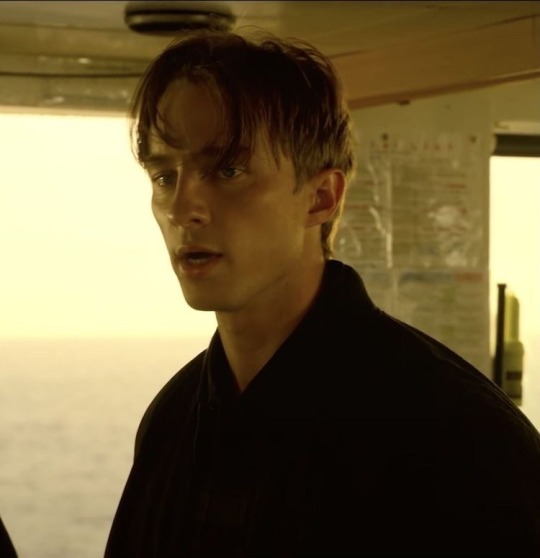

toxic!dark!rafe cameron x female!pogue!reader
summary: you are just living your life, completely normal and free. but, what happens when rafe cameron decides that you are his? he's danger.
warnings: smut! 18+ stalking, manipulation, rafe is obsessed with reader, fingering, swearing, unprotected sex, slight breeding kink, praise, oral (male receiving), dark!rafe cameron, choking, jealousy, violence, heavy smut..
a/n: i'm delighted I'm finally starting this, even if it took me so long. i genuinely hope you all enjoy this series. i understand that this a bit short, but the narrative is only getting started, so things will only get wilder! however, it is to be expected—this is a rafe cameron fic.
series

One thing that you hated about Outer Banks was how the heat still radiated at night, causing excessive amounts of water to be drank and a great amount of fans that blew hot air into your face.
It only made everyone irritable and only caused more arguments like now,
"I swear to god JJ, I am about to fucking murder you if you say another word," You hissed, giving him a glare as he mockingly grew scared.
"I agree," Cleo said before falling back into her nap.
"All I'm saying is that we have been moping around here for hours meanwhile we could be partying on the fresh beach and cool water," JJ replied, using his hands to represent the scenery to all of you.
"I'm going to have to agree with Y/N," Pope said, turning his head to JJ, "I'm already in tough shit with my parents for when you knocked over my great-grandmothers vase," Pope glared.
JJ put his hands up in defense, "I told you tequila makes me clumsy,"
"Besides every single Kook is there, including Rafe and if he sees Sarah with us, it will only bring another fight and you are not going back to jail," Kie warned, still closing her eyes while the fan blew the air in her face, blowing her hair.
"When have we ever been scared of Rafe?" JJ asked.
"When he gave me a full smackdown for doing my job," Pope scoffed.
"And when he almost drowned me," Sarah chimed in from across the room where she was laying on John B's legs on the carpet floor.
"And when he shot Sheriff Peterkin in front of us," John B added.
"And when-" Pope began.
"Okay that's enough," He said as you giggled, turning your head back to the fan.
You didn't know much about Rafe Cameron since you had moved to Outer Banks only last year and you had met the "star Pogues" a few months ago.
You had never really seen Rafe's face ever, only heard of him honestly.
But you didn't know if it was a bad thing.
All you had heard about was how evil and villainous he was which caused some places to be off limits for the fact that the boys couldn't handle another beat down with the Kooks and there was a greater matter at hand.
But still, you always were curious about "evil" Rafe Cameron.
"You guys are no fun," JJ pouted, sitting beside you on the couch.
You patted the lower part of his leg, "Poor baby," You sarcastically said to which moved his leg swiftly causing you to laugh.
Suddenly the lights and fans turned off as you all except for JJ groaned, knowing that meant the electricity was off you and you would have to deal with the heat and darkness.
Which meant the only choice was the beach party,
JJ cheered, "I win!"

You crossed your arms as you walked on the warm sand, lots of cheering and loud music around you. You could see the Kooks and the Pogues in their own groups, not daring to interact with eachother.
It was hard to get used to the fact that there were two groups of people based on economic statuses and that it meant that if you were one thing, the other one hated you.
You had never been to a place like that but you just kinda got used to it.
Yet you still could never tell which group was really which sometimes.
You were forced to walk around by yourself as John B and Sarah wandered off to a quiet spot while JJ started drinking with Kie as his babysitter and Cleo and Pope wandered around.
All of it sounded like a lot of third wheeling which made you stay away.
But you didn't mind being alone, you liked listening to the waves and watching the festivities that went along with a party.
And you knew that a beer would help you get more into the party festivities.
You walked over the keg where a man with a shaved head and a matching tank top and shorts poured himself a beer as you curiously looked at him.
You had to admit that he was one of the most attractive men you had seen before.
His lips were a perfect shade of pink and they were smooth like sucking on a cherry. His veins were bulging from his hands and you could see the peach fuzz on his jawline that you could only really see upclose.
You snapped out of your analysis as he looked at you as you waited there awkwardly, forming a smile on your face.
"Sorry to creepily stand here, I'm just trying to get a uh-" You said, pointing to the keg.
His face studied you for a second, almost as if he was trying to figure you out. You could tell by his face that he had never seen you before and he looked as if he was trying to figure out if you were a Kook or Pogue.
He chuckled, "Didn't mean to take so long, I wouldn't have if I had seen your pretty face sooner," He smirked, looking you up and down, causing you to blush.
You felt stupid for blushing over something that a man probably said to every pretty girl he saw but you felt something different about him.
You were taken aback by his boldness, "Do you say that to every women that waits for her turn on the keg?" You teased.
"Only the pretty ones," He replied, causing you to laugh.
"Smooth talker I see," You smiled.
"Always," He joked, "I swear I've never seen you around and usually, you know everyone in Outer Banks," He probed.
"Yeah, I just moved here last year," You answered, "I haven't made my rounds yet,"
"Figured," He said, "I would've definitely noticed you,"
"Pfft," You beamed, "I'm sure you would've walked past me on the beach, there are many beautiful girls here,"
"Nah," He laughed, looking off, "You are different from them,"
"How could you already assume that?" You asked, curiosity biting at you.
"For one, you aren't stuck up and preppy which is most the girls on this island," He grinned as you giggled.
"Ay, they aren't all like that," You replied.
"Most of 'em," He added, "But I don't pay much attention to them,"
"Figures," You said, eyebrow raising.
He saw your eyes move the keg and his cup before he offered his cup forward.
"Might as well take mine, I wouldn't feel proud of myself if I let you pour one yourself," He winked.
Great attempt at being a gentlemen.
"No no, I got it," You said before he shook his head.
"I insist" He said, his thumb grazing yours.
"Thank you," You smiled, "I'm Y/N" You introduced, taking the cup from him while extending your other hand for him to shake.
He shook your hand, "I'm Rafe," He replied with a smile as yours slowly fell.
The Rafe? The Rafe you were basically supposed to never interact with and who was the supposed devil? That Rafe?
"Rafe Cameron?" You asked, standing frozen.
"Guess my reputation precedes me," He joked as you didn't laugh but instead cleared your throat.
You took your hand back quickly, "Oh, i-it's nice to meet you," You cleared your throat, "My friends are waiting so I'm gonna-"
He clearly figured you out, "Pogue, I'm guessing?" He snickered.
Your face wrinkled, "Is that supposed to be a funny thing?"
"Hilarious actually," He answered, only angering you more.
"I don't see what's funny about that?" You crossed your arms with ur drink resting in your hand.
He wiped his jaw, "Must be tough at the bottom of the food chain,"
Your nose flared, "Must be tough being an elite asshole,"
He laughed, "I just think it's an unfortunate cause, I mean it's just unlucky," He smirked.
Asshole.
"Unlucky?" Your lip pursed, " I think what's more unlucky is thinking that your cool for a fucked up economic status that has been perpetuated on an island,"
"I just don't believe your friends belong on Outer Banks," He said, not a hint of hesitance in his voice.
He really believed in this bullshit.
"I mean you would really rather hang out with a group of dirty Pogues?" He snickered, looking off.
"Well I am one of them and they are my friends," You scoffed, "You seem more dirty than us," You insulted.
"Is that so?" Rafe mocked.
"Do you wanna talk about your father's dirty money?" You asked.
"I would watch that pretty mouth," He replied, inching closer.
"Or what?" You hummed, acting braver than you usually would.
"Fuck around and find out sweetheart," He came closer, breath fawning on your face.
The whiskey on his breath kissed your nose but not breaking your eye contact with him as you inched closer, eyes on his lips.
As he tried to close the gap, you threw the drink in his face. "Oohs" and snickers filled around the both of you as you stomped away from him.
He smirked, wiping the alcohol off of his face.
'What an asshole,' You thought,
Little did you know that Rafe only grew to like you more.

You found JJ and Kie sitting by the beach together as she laid her head on his shoulder. You were thinking about interrupting them but tarnish their moment, you choosing instead to call it a night and also you didn't feel like trying to find the rest of the group.
You were glad that you knew yourself enough to drive to the party considering that you got tired fast. You couldn't really see in the parking lot due to how dark it was and away from the lights.
You digged in your back pocket for your phone to pull out of the flashlight as you reached for your keys but dropped them instead in the process.
You audibly groaned as you searched on the floor in the darkness for the keys. You went on your knees with your flashing light, searching on the ground as you heard footsteps behind you, darting your flashlight behind you but seeing nothing.
You had a bad feeling but you thought it was paranoia because you were alone in the parking lot and maybe a little due to the interaction you had earlier with Rafe.
You couldn't stop thinking about how he came off as nice but switched so quickly into an elitist piece of shit.
Sounds like how they described him.
But still, there was a pit in your stomach that felt like butterflies when he grazed your thumb.
You sighed, pushing the thoughts out as you finally grabbed your keys, using the concrete-sanded floor push yourself back up off the ground.
Suddenly, you felt a cloth on your mouth and a hand covering your waist as your muffled screams filled the parking lot, trying to kick your attacker behind you.
You felt yourself drifting into the darkness as you screamed one last time,
And everything went black.

tags: @hysteriahall @avengersassemblee @lighttism @whereismymindnow @hotch-meeeeeuppppp @vi06ma01 @haven247 @vanessa-rafesgirl @blvebanisters @riordanness @aleidag1rly @muzanjackson22
#dark obx#dark!rafe#obx#rafe cameron#dark rafe cameron#drew starkey#outer banks#dark fic#rafe cameron x reader#toxic!rafe#toxic!rafe cameron#toxic relationship#obx2#rafe obx#obx3#obx fic#outerbanks rafe#outerbanks masterlist#rafe cameron imagine#rafe outer banks#outer banks smut#rafe cameron smut#rafe x you#rafe x reader#rafe smut#rafe fic#rafecameron#rafe#rafe fanfiction#singmyaubade
4K notes
·
View notes
Text
I adore the fact that in so many other stories, Mob Psycho would’ve concluded with the World Domination Arc. After all, it has the big, climatic battle with the ensemble cast versus the overarching villain. They win, and everyone goes home, all’s well that ends well, right?
Except the story doesn’t end there. Because Mob has yet to reckon with this internal, antagonist force that has haunted the narrative since the very beginning: Himself.
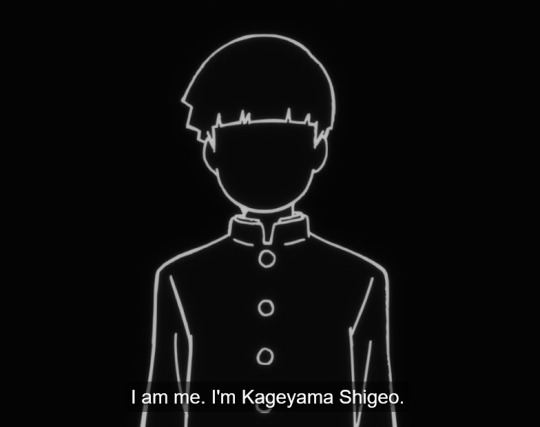
When Mob comes face-to-face with ???% at long last, he says: I am Kageyama Shigeo.
This isn’t a conflict with a villain, or another esper, or even a separate entity that resides inside Mob’s body. It is something far more personal, and far more relatable.
???% is the culmination of everything Mob’s held back. Not just emotions like anger or fear. Even his desires, like his crush on Tsubomi. All muted by his efforts not to hurt anybody with his powers. Mob has come such a long way, but he’s still restraining his feelings so tightly that the moment his control wavered, ???% took over.
But the conflict isn’t the destruction ???% is wreaking just by walking through the city. The conflict is Mob refusing to accept this part of himself he’s suppressed for so long.
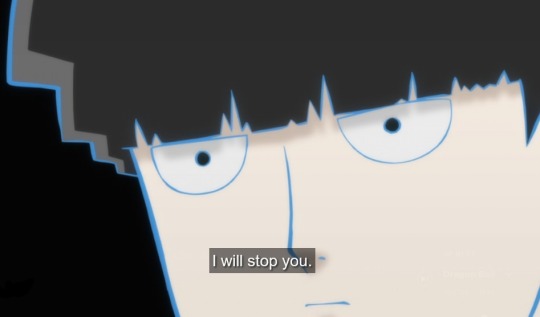
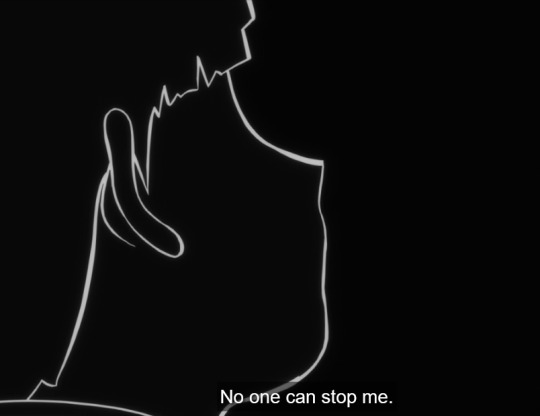
And ???% is right! Every attempt to stop him thus far has failed. Because he isn’t meant to be stopped. Mob has to reconcile with the parts of himself that he won’t acknowledge.
And it’s the most difficult thing Mob has ever had to do! This is the part of himself that hurt his brother; that hurt his friends and decimated so much of the city. Reconciling with it means accepting that Mob hurt those people, whether he wanted to or not. It means accepting all facets of himself, even ones he’s not proud of or wishes he could change but cannot.
Mob has grown so much in this latest season alone, he hasn’t had any explosions, and he felt confident enough in his own abilities to actually ask Tsubomi out, which was something the Mob of two seasons ago could never imagine.
But what about the advice Reigen gave him for his confession to Tsubomi?
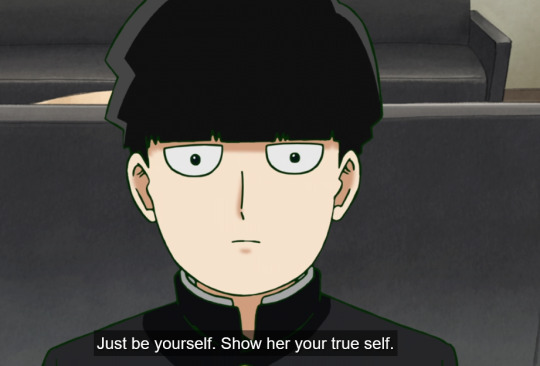
His true self, in its totality. This is what Mob has struggled with the entire story. This is why his confession to Tsubomi is the culmination of his character arc. Expressing his feelings means exposing his true self to someone else, even with the fear of rejection.
And while we’re on that subject. Let’s talk about Reigen. Right after he gives this advice to Mob, he says this about himself:
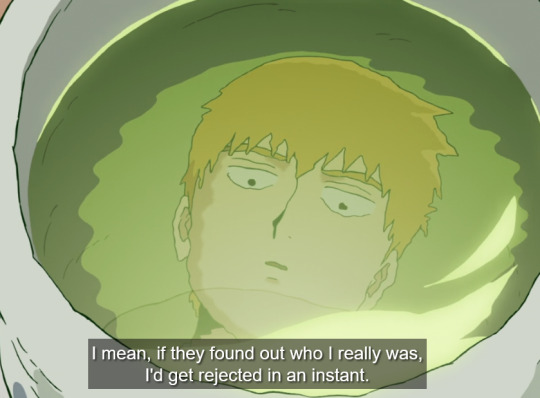
It is the height of irony (and tragedy) that Mob and Reigen admire each other’s strengths so much, yet have no idea they struggle with the same exact fear: that if the people they cared for found out who they truly were, they would reject them. It is why Reigen relies on lies and why Mob suppresses himself.
It is also why Reigen has never actually witnessed ???% until now. It is why Mob has never heard Reigen admit the truth about himself out loud.
And that’s why the final arc feels like such a gut-punch in the best of ways. What is harder than accepting who you are, and hoping for others to accept you as you are? Even at your most deceitful, or your most destructive? Mob Psycho ends with the Confession Arc because that’s the very heart of the story.
#mp100#mob psycho 100#mp100 spoilers#mp100 s3 spoilers#kageyama shigeo#reigen arakata#tearing up as I typed this don’t mind me#I’m a manga reader too but seeing this animated finally got to ne#and then the reigen parallels hit me!!!#I’m not Ready for next episode
9K notes
·
View notes
Text

Are You Satisfied?
As you might have heard chapter 236 of Jujutsu Kaisen ends with the death of Gojo Satoru. The fandom is making a pretty big deal about it. As someone who predicted from the beginning that Gojo was going to lose against Sukuna, the reaction is fascinating to me. This is perhaps the most controversial chapter of Jujutsu Kaisen I've ever seen. So I've decided to throw my hat into the ring.
The central theme of Jujutsu Kaisen is death, so the death of one of the main characters isn't too surprising, but what does Gojo's death mean for the story? What does it say about his character?
As I said above I am a little bit shocked by the extreme controversy over Gojo's death. Gojo was never going to win the fight in the first place, because Jujutsu Kaisen is a story and the story would be over if he defeated Sukuna. He'd easily be able to take care of Kenjaku afterwards and the main conflcit would be resolved. Would it really be an interesting story if Gojo one shotted the villains while the kids just wathced on Television?
The story is also not about Gojo, it's about the students. Gojo may think he's the protagonist of reality but he's not the protagonist of the story.
Once again, Jujutsu Kaisen is a story and stories have themes. We may grow personally attached to characters, but characters are just narrative tools to convey the themes of a story, no different from prose, dialogue, and art. Characters are a tool to be used well or used poorly, and sometimes yes that means killing them. Whether Gojo's death was naratively satisfying though isn't the purpose of this post though we're only asking what does it mean?
Finally, Jujutsu Kaisen is not only a fictional story, it's specifically a tragedy. Full disclosure, it's a manga about death.
The Protagonist of a Tragedy
So, number one shout out to me for making this post 4 months ago where I called the way Gojo would end the fight.


Excuse me while I fist pump for calling it!
The question on everyone's minds is why does one of the most powerful characters in the manga die offscreen in a pretty humiliating way, cut in half and helpless on the ground just like Kaneki. The reason Gojo didn't get a more heroic (or cooler) death is because we're not reading My Hero Academia, this is not a story about heroes or even a typical Shonen manga it is a tragedy.
In poetics Aristotle defines tragedy as:
"an imitation of an action that is serious, complete, and of a certain magnitude; in language embellished with each kind of artistic ornament, the several kinds being found in separate parts of the play; in the form of action, not of narrative; through pity and fear effecting the proper purgation of these emotions" (51).
To paraphrase a tragedy is about human action, actions characters make in a tragedy often have dire consequences. One of the most common consequences if the reversal of a hero's fortune, a hero of a tragedy usually starts out on top and ends up on the bottom because of the bad choices they make. If in normal shonen manga characters overcome their flaws through effort and persistence, in Jujutsu Kaisen we see characters more often than not lose to their flaws.
The reason I posted that Kaneki panel specifically is because it was a brilliant moment of narrative punishment for Kaneki's central character flaw. Kaneki the hero's main flaw is that he always fights alone, and he constantly makes that same choice over and over again to fight alone. One of the characters helpfully explains it as well.

Stories are primarily about change. If a character doesn't change they're not serving the plot, unless that specifically is the point. People have pointed out how abrupt it is for Gojo to get sealed in Shibuya, get let out, and then immediately die afterwards but that's kind of the point. Gojo made more or less the exact same choice (he asked for Utahime's help for a buff but otherwise fought the entire battle himself). The definition of insanity and what not, why would doing the same thing over and over again net him a different result?

Not only did Gojo choose to fight alone, but as I've been hammering on and on about in previous meta the entire fight Gojo cared more about fighting a strong opponent then he did saving Megumi, the child he was responsible for.
Jujutsu Kaisen is not a typical shonen manga where everything is resolved by beating a strong villain in a fight. That's specifically why I used the Tokyo Ghoul reference, because the reason Kaneki is defeated offscreen like that is because he thought the world worked like a shonen manga. He has a fantasy sequence where he's fighting Juzo in a shonen battle tournament like this is Yu Yu Hakusho right before it snaps back to reality and he's limbless on the ground.
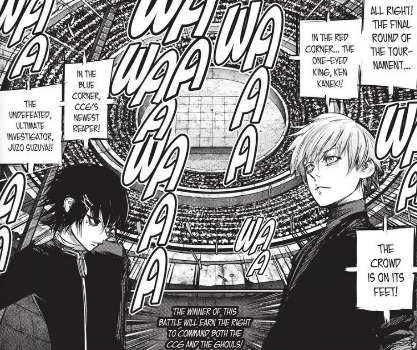
Gojo is a major character in the manga Jujutsu Kaisen, literally "Sorcery Fight" and he is the best sorcerer in the whole world. His entire identity revolves around being a sorcerer. Since he is so good and beloved at what he does, he thinks that everything is resolved by exorcising a curse or defeating a strong opponent. He has basically no identity outside of that. Which is why when he's fighting the possessed body of his student, a person he's been mentoring since childhood his priority is not to save Megumi but to beat a strong opponent. Gojo is a sorcerer, before a human being. That's who he is, that's who he always has been since day one.
I think part of the negative fan reaction comes from fans being really attached to this scene in the manga and deciding Gojo's entire character revolves around being a good mentor figure to children.

Which is just incorrect, Gojo's entire character revolves around being the strongest. On top of that though, Gojo can care about children and also care about being the strongest he can care about multiple things at once and have those things contradict each other because humans are complicated. I'd point out even in this panel where he's stating motivation he's not trying to raise these kids up into being healthy adults, he wants them to be strong Jujutsu Sorcerers. Even when he's raising kids, his intention is to turn them into Jujutsu Sorcerers because everything in Gojo's mind revolves around Jujutsu Sorcery. Gojo does not exist outside of the world of sorcerers. Gojo may be the chosen one but he'd never be able to hold down a job at Mcdonalds.
I think in general readers put more investment in the things characters say out loud, rather than their actions. You can say one thing and do another. I can say "I should never eat sweets again I'm going to improve my diet", and then go and eat ice cream five hours later. Gojo can state out loud his intention to foster children and protect their youths, but then fail to properly do that in the story. Characters are not always what they say they are, that's why they're interesting to interpret. This isn't me calling the readers stupid, just pointing out that Gojo is made up of contradictions. He wants to get rid of the old guard and replace them with something new, but Gojo IS THE OLD GUARD.
If the culling games arc has shown us one thing, it's that ancient sorcerers brought to the modern age do not care that much about human life on an individual level, they are all of them egoists. There's a reason Gojo resembles someone like Sukuna more than he does any other character in the manga. I'm not saying Gojo is exactly like Sukuna, he's far more altruistic and uses his genuinely noble ideals but at the same time Sukuna is a shadow archetype to Gojo he represents Gojo's flaws. The flaws that Gojo succumbs to in tragic fashion.
Which if you believe that Gojo genuinely does love his students, and the ideal he's fighting for is to raise up a better generation and allow them to live out their youths, then Gojo throughout the entire Sukuna fight is acting against those ideals. He cares far more about fighting Sukuna then he does saving Megumi, it's shown over and over again in the battle, Megumi is an afterthought to him. If Gojo care moredefeating the big bad and saving the world is more important than helping a child that Gojo is responsible for then Gojo is acting against his stated principles. Why should Gojo win the fight when he's fighting for all the wrong reasons?
Tragedies are like visual novels, if you make the wrong choice the novel will give you a red flag. If you ignore the red flag then you get locked into the route with the bad ending. Gojo always fights alone. Gojo only ever fights for himself, even if he's using that selfishness in support of a more noble ideal like creating a better generation of sorcerers. If Gojo consecutively makes the same changes then in a tragedy he's not going to be rewarded for it.
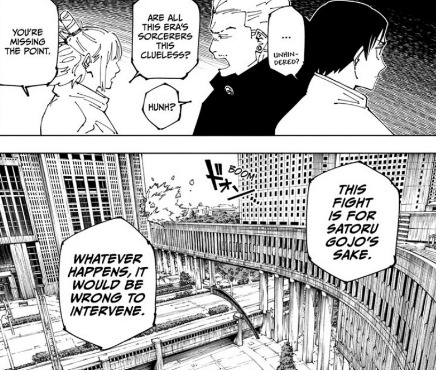
Gojo wants the old generation out and the new generation in, but Gojo resembles the old generation too much. Old sorcerers like Hajime and Sukuna respect him, Hajime argues that Gojo being able to fight for his pride is far more important than him living to the end of the battle when Yuta wanted to interfere and help him.
Gojo's death isn't a surprise curve ball that Gege is throwing us for shock value, it's a result of his choices throughout the manga. A manga about change, and the change between generations is not going to punish a character for remaining roughly the same. Of course you might find it disappointing that Gege didn't give Gojo the chance to grow and change and experience a character arc like Megumi or Yuji, but Jujutsu Kaisen is a tragedy, and the way Gojo's arc ended is consistent with what Gege wrote.

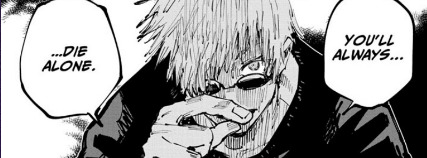
Jujutsu Kaisen is not just a tragedy though, it's a manga about death. The manga begins with Yuji's grandfather warning him not to die alone the way that he did. His grandfather's dying words are what motivate Yuji throughout the beginning of the manga as he's searching for a "proper" death.
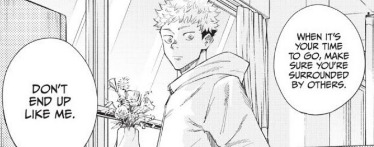
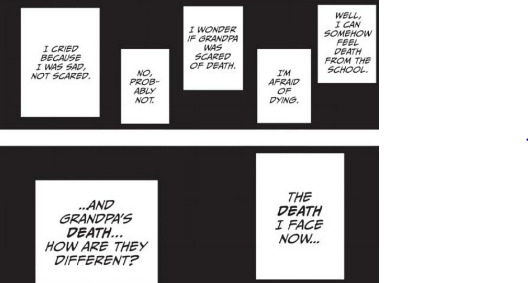

One of the major themes of Yuji's character is a contemplation of death. He accepts that death is inevitable, so he wants to save them from the gruesome deaths they'd experience if they became victims to curses and allow them to have a more satisfying death. Yuji's grandpa died an unsatisfying death because he died alone in a hospital room. Yuji even tries to make his own death a satisfying one because he believes by dying to seal away Sukuna he'll reduce the total number of casualties to curses.
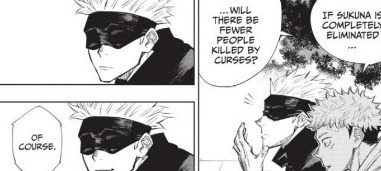
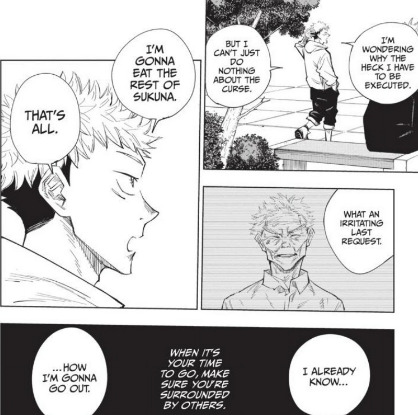
Jujutsu Kaisen keeps investigating the theme of death and what exactly would make for a satisfying death. At one point it's all but stated that death is the mirror that makes humans analyze their lives.
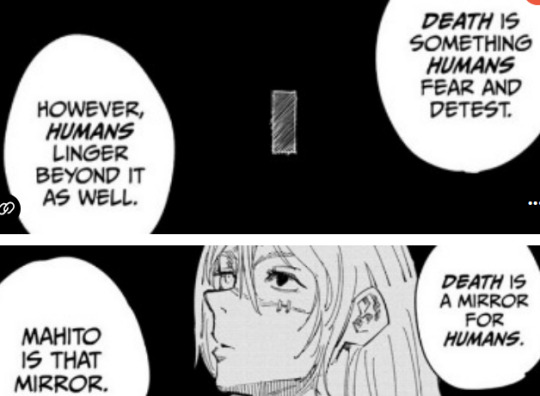
When Yuji fails to save Junpei from the "unnatural death" it calls into question whether or not his goal of saving people from unsatisfying deaths and the gruesome deaths caused by curses is even feasible. Nanami even says that Yuji might not be able to accomplish his goal and warns him away from the path.
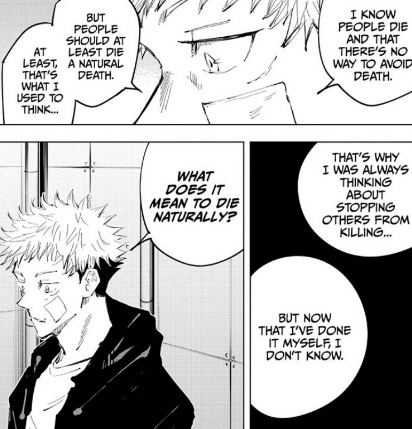
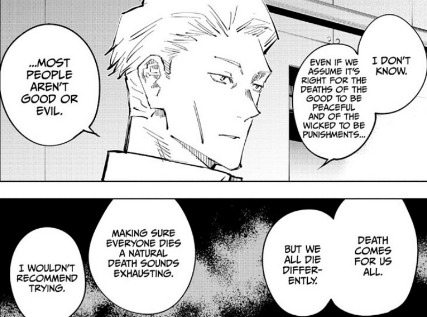
We see repeated unsatifying deaths in the manga, each time someone reflecting on their deaths that they weren't able to get what they wanted out of life. This list comes via @kaibutsushidousha by the way I'm quoting them.
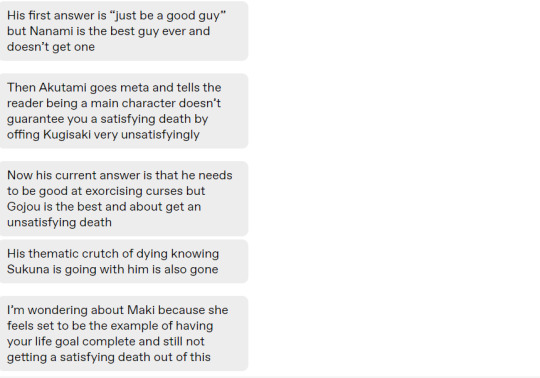
Nanami's a character who chose to work as a sorcerer because he didn't want to evade the responsibility of doing all you can to help people, he wanted to believe he's somewhere where he's needed. He never runs away from responsibility like Mei Mei does so he quite literally works himself to death, living and dying as a sorcerer. Nanami or Gojo's dying hallucination of Nanami even says as much, his death is the result of him choosing to go south and returning to be a sorcerer.
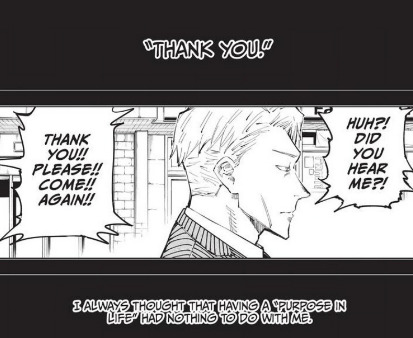
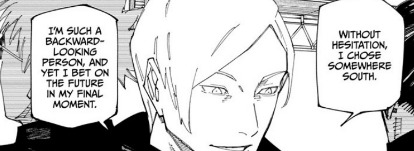
Maki chose revenge against the Zen'in over her sister, and as a result Mai is dead. Maki has all the power in the world now, her revenge complete but she's left with a sense of "now what?" She's as strong as Toji now but she failed to protect her sister, and it's the result of the choices she made. Maki's reflection isn't triumph, it's "I should have chosen to die with her."

Even Yuji himself is robbed of his narrative purpose. The manga began with Yuji saying he wants to choose how he's going to die and he'll die taking out Sukuna with him so he can reduce the number of people killed by curses in the world. Both of those things are thrown in Sukuna's face. Number one the amount of people Yuji can save by permanently killing Sukuna is now a moot point because he let Sukuna rampage in Shibuya.
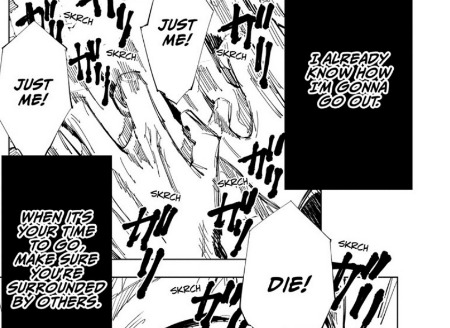
Number two, Sukuna isn't even in Yuji anymore. To build on what Comun said though, this repeated tragedy has a purpose to it and understanding requires understanding that Jujutsu Kaisen is an existentialist manga. Existentialism is basically a school of philosophy centered around the question of "Why do I exist?"
There's nothing about the invetability of death to make you question why you're alive in the first place. In the myth of Sispyhus, Albert Camus boils down all of philosophy to one question.
"There is but one truly serious philosophical problem, and that is suicide. Judging whether life is or is not worth living amounts to answering the fundamental question of philosophy. "
All of philosophy is should I shoot myself in the head or should I keep living? Everything comes after that question, which is why in Jujutsu Kaisen a lot of the characters motivations revolve around them contemplating death. Sorcerers exist in a world where they can die any moment, and as Gojo says most of them die alone. It might be the nature of sorcery itself that causes so many people to die, not only are they dying because they are trapped in an uncaring system, but the characters themselves aren't really attempting to live outside of it. They live and die as sorcerers, replaceable cogs in the machine.
All of these unsatisfying deaths may just be the result of all these characters making one choice, to live as sorcerers rather than people. Because to exist means to live in the world.
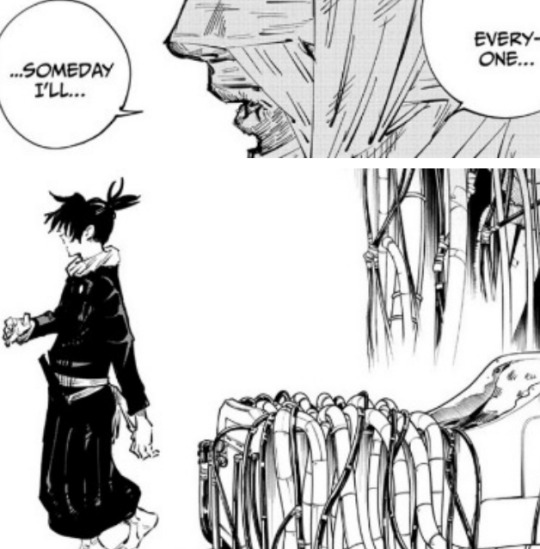

Even in Mechamaru's case, his goal is deeply existentialist by what I defined, all he wants to do is live in the world with everyone else rather than be stuck in his hospital room but his actions contradict that goal. Instead of letting his friends come and visit he's obsessed with the idea of getting a normal body because he feels that's the only way he can exist with everyone else, he makes a deal with the devil, he lies and goes behind their backs. He wasn't living with everyone else in the world and he could have chosen to, he chose wrong and his death is the result of that choice.

Jujutsu Sorcerers aren't living in the world. They're living in a little snowglobe far removed from the world with its own rules, most of them regressive and disconnected from the rest of society. If you define existentialism as just "living in the world' then a lot of these characters aren't, because they only exist in the world of sorcery.
INVISIBLE BUFFY: What are you talking ab-
SPIKE: The only reason you're here, is that you're not here. (drinking) INVISIBLE BUFFY: Right. Of course, as usual there's something wrong with Buffy. She came back all wrong. (moving around on the bed) You know, I didn't ask for this to happen to me.
SPIKE: Not too put off by it though, are you? (drinking) INVISIBLE BUFFY: No! Maybe because for the first time since ... I'm free. She tosses the sheet aside. Spike looks around, trying to figure out where she's going.
INVISIBLE BUFFY: Free of rules and reports ... free of this life.
SPIKE: Free of life? Got another name for that. Dead.
Not living in the world with everyone else is the same as being dead.
A lot of these characters either make the choice to act alone, or be a jujutsu sorcerer rather than a person and because of that they die as sorcerers, b/c sorcerers die that's what they do. Mai didn't want to keep living as a hindrance to Maki so she kills herself. Maki didn't want to be anything other than a sorcerer, so her little sister dies and she's not a big sister anymore. Nanami chose to leave his job behind and become a sorcerer again, he dies as one.
Of course I don't think the manga is punishing characters for being too egotistical, but rather too unbalanced. If anything Mai is too selfless and that is why she died, she didn't want to live for herself and chooses self sacrifice for her sister. An unbalance between selfishness or selflessness results in an underdeveloped ego. Jujutsu Kaisen doesn't punish individualism per se, moreso if you're not a fully developed individual you won't last long. Because it's also a manga about growing up in the world, and a person who doesn't have a healthy, mature, well-balanced sense of self is not a grown up.
This twitter user det_critics points out that Gojo (and also Yuki + Yuji's) failures in the manga can be attributed to the fact they don't have real senses of self.
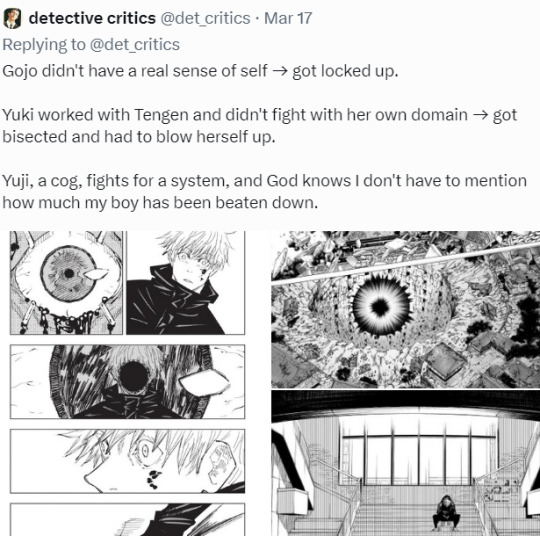
Gojo has an identity crisis as outlined by Geto, "are you Satoru Gojo because you're the strongest, or are you the strongest because you're Satoru Gojo?"
It's a challenge for him to find some reason to live outside of being the strongest, and in tragic fashion Gojo just doesn't find it in time. Gojo lived for fighting others, and proving to himself that he's the strongest, and that's how he dies.
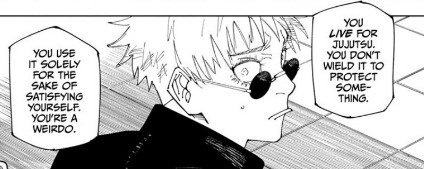
There's something I like to say about narrative punishment in stories. There are two ways to punish a character, you either don't give them what they want, or you give them exactly what they want. This is the latter, Gojo wanted to find someone stronger than him because deep down he believed that nobody could understand him unless they were on his level. He wanted to be surpassed, and that's why he focused on creating stronger young sorcerers, but he never shook himself of the belief that only someone as strong or even stronger than he was could ever be emotionally attached to him so he made a deliberate choice to draw a line between himself and others.
Gojo's essentially gotten what he wanted from that choice in the worst way possible. The student he picked to succeed him Megumi, has his body stolen and kills him. Gojo is surpassed, but it's not by one of his own students it's by an enemy that's not only trying to kill Gojo but is going to massacre his students afterwards.
Gojo's spent his entire life believing that because he's more powerful that makes him inherently different and above others, and being lonely because he himself believed he couldn't relate to ordinary people and he dies like an ordinary person, an unsatisfying death where he wasn't able to bring out Sukuna's best, where he gets unceremoniously cut in half offscreen but yay he's no longer the strongest. He's gotten exactly what he wanted. Megumi is still not saved, Sukuna's probably going to kill more people because Gojo failed to stop him here, but hey at least he stopped to compliment Gojo.
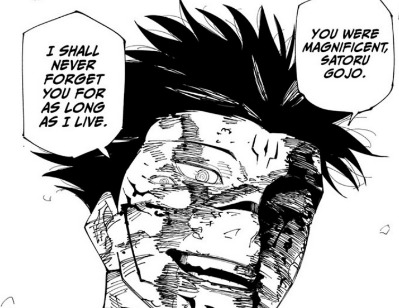
It's empty, but it's empty because of the choices Gojo made in life to just not bother connecting to people or develop any kind of identity besides being a sorcerer. Gojo lives and dies as a sorcerer, and his dying dream is returning to a teenager being surrounded by everyone he was with during his school days, because that's the happiest time in his life. Ironically he was happier before he became the strongest, because that was the only time in his life that he allowed himself to connect to people.
However in the eyes of others, he is someone who has it all. That's why he is always alone. There was no one who could hold the same sentiments and mutually understand him. Geto was the only one who could understand what he was trying to say, and the only one who could communicate well with him.
It's no coincidence Gojo and Geto die exactly a year apart on the same day, if anything I'd say the reasons they die are similiar to at least thematically. They both die because they don't want to live in the world. Geto thinks the world is too corrupt and GOjo doesn't want to be anything other than a sorcerer, both of them fail to adapt.
「 'It's just. . .'
It's just that it was what Geto had to do.
[...] To someone like him, the reality that the world of sorcerers presented to him was just too cruel.
'. . .that in a world like this, I couldn't truly be happy from the bottom of my heart.'」
They can't be happy in a world like this from the bottom of their hearts, so narratively they both die. The things they chose to live for at the end of their life they fail to accomplish, Gojo is no longer the stronget, Geto fails to wipe out mankind or make major changes to the world and they die as normal people unsatisfied because they weren't trying to live in the world and make connections to others. They die almost karmically a year apart because their main connection for both of them, the thing which made them feel connected to the world and other people was each other.
Which is why this panel breaks my heart and is so narratively satisfying because of how unsatisfying it is...
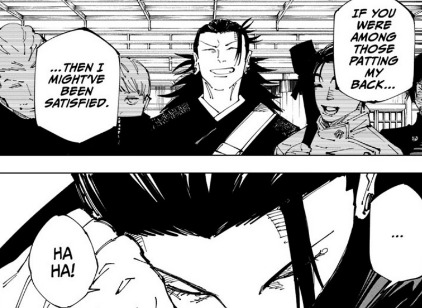
"If you were among those patting my back... then I might've been satisfied."
Gojo reflects that he's not satisfied dying against Sukuna, not because he failed to give him a good enough challenge but because Geto wasn't there to pat him on the back. The one thing that would have satisfied him he couldn't have, because he didn't live to connect to people he lived to be the strongest and he died alone as the strongest. There's just something deeply upsetting about Gojo's dying dream fantasy just him being there talking with all of his dead friends who he never appreciated or connected to properly when he was alive. Knowing that if something had just gone a little differently, that even if he had to die no matter what he could have died happier if Geto was among the people saying goodbye to him because that connection with Geto is what gave his life meaning.
Dazai Osamu: "A life with someone you can say good-bye to is a good life, especially when it hurts so much to say it to them. Am I wrong?"
-Bungou Stray Dogs Beast
#gojo satoru#jjk spoilers#jjk meta#jujutsu kaisen 236 spoilers#jjk 236#jujutsu kaisen 236#jjk 236 spoilers#jujutsu kaisen#jujustu kaisen meta#jujutsu kaisen theory#jujutsu kaisen manga#satoru gojo#geto suguru#suguru geto#satosugu
2K notes
·
View notes
Text
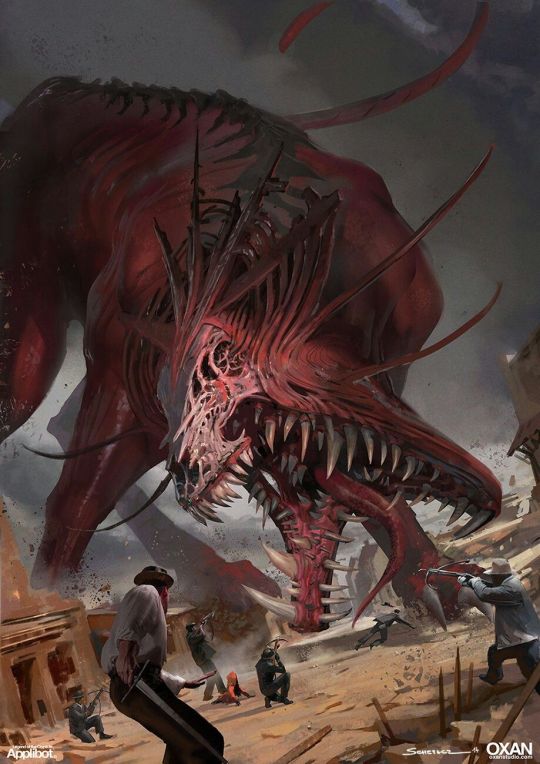
Monsters Reimagined: Yeenoghu, Demon Lord of Insatiable Hunger
It's been some years since I did my overhaul on the lore of the gnolls and how they embody the weird de/humanization that goes on with various monsters over d&d's history. Ever since I've had more than a few folks write in asking about how I would handle the default Gnoll God Yeenoghu, who exists in a similar state of "Kill everything that ever existed" to Orcus and a good portion of the game's other late game threats, thematically flat and not really useful for building stories around.
For a while I've avoided doing this post because I thought it might skew a little too close to my personal philosophy, and risk going from simply being influenced by my views to an outright soapbox. I personally hold that despite being part of our nature hunger is the source of the majority of human cruelty, and if society and cooperation are the tools we developed to best fight against the threat of famine, it is fear of that famine that allows the powerful to control society and secure their positions of privilege.
I've also dealt with disordered eating in a prior period of my life, alternating between neglecting my body's needs and punishing myself for needing in the first place. I'm well acquainted with hunger and the hollowing effect it can have, though I'd never claim to know it so well as someone who went hungry by anything other than choice and self hatred.
Learning to love food again saved saved my life. The joy of eating, of feeling whole and nourished, yes, but there was also the joy of making: of experimenting, improving, providing, being connected to a great tradition of cultivation which has guided our entire species.
If I was going to talk about an evil god of hunger, I was going to have to touch on all of that, and now that it's out in the open I can continue with a more thematic and narrative discussion on the beast of butchery below the cut.
What's wrong: Going by the default lore, there's not much that really separates Yeenoghu from any other chaotic evil mega-boss. He wants to kill everything in vicious ways, and encourages his followers to do the same. He's there so that the evil clerics can have someone to pray to because the objectively good gods are on the party's side and wouldn't help a bunch of cannibalistic slavers.
This is boring, we've done this song and dance before, and the only reason that there are so many demon lords/evil gods/archdevils like this is because the bioessentialism baked into the older editions of the game's lore was also a theological essentialism, and that every group had to have their own gods which perfectly embodied their ethos and there was no crossover whatsoever, themes be damned.
Normally I'd do a whole section about "what can be salvaged" from an old concept, but we're scraping the bottom of the barrel right from the inset. Likewise my trick of combining multiple bits of underwritten d&d mythology to make a sturdier concept isn't going to work as most of d&d's other gods of hunger or famine are similar levels of paper thin.
How do we fix it: I want Yeenoghu to be the opposite of the path I found myself on, a hunger so great and so painful that it percludes happiness, cooperation, or even rational thought. Hunger not as a sumptuous hedonistic gluttony but a hollowing emptiness that compels violence and desperation. More than just psychopathic slaughter and gore, it is becalmed sailors drinking seawater to quench their thirst, the urban poor mixing sawdust and plaster into their food because their wages are not enough to afford grain.
This is where we get the idea of Yeenoghu as an enemy of society, not because violence is antithical to society ( I think we've learned by now how structured violence can really be) but because society fundamentally breaks down when it can't take care of the people who provide its foundations. Contrast the Beast of Butchery with one of my other favourite villainous famine spirits: Caracalla the grim trader, who embodies scarcity as a form of profit and control in to Yeenoghu's scarcity as suffering.
Into this we can also add the idea of the hungry dead, ghouls yes but also vampires, anything cursed with an eternal existence and appetites it no longer has the ability to sate. A large number of cultures across the world share the idea that the dead cannot rest while they are starving, which is why we leave offerings of food by their graves or pour out a glass to the ones we lost along the way.
On that topic, there's also a scrap of lore involving Doresain god of ghouls, who has been depicted as an on and off servant of Yeenoghu. Since I'm already remaking the mythology, I'd have Doresain act as a sort of saint or herald for the demon lord, the wicked but still partially reasonable entity who can villain monolog before the feral and all consuming demon god shows up.
Summing it all up: Yeenoghu isn't a demon you wittingly worship, it's a demon that claims you, marks you as its mouthpiece and through you seeks to consume more of the world. It gives you just enough strength to keep on living, keep on suffering, keep on filling that hole in your belly and feed it in turn.
The greatest of these mouthpieces is Doresain, an elf of ancient times who's unearthly hungers elevated him to demigod status. Known as the knawbone king, he dwells within a dread domain of the shadowfell, and is sought out only for his ability to intercede with the maw-fiend's rampages.
Signs: Unnaturally persistent hunger pangs, excessive drool and gurgling stomach noises, the growth of extra teeth in the mouth, stomachs splitting open into mouths.
Symbols: An animal with three jaws, a three tailed flail or spiked whip. A crown of knawed bones (Doresain)
Titles: Beast of butchery, the maw fiend, the knawing god
Artist
547 notes
·
View notes
Text
Arcane does a fun thing with its narrative Darkest Hour.
Or: yet another post about how insanely smart this show is and how absolutely genius its writers are (and how jealous of them I am).
For the uninitiated, the Darkest Hour is the moment just before the climax in which the heroes are at their lowest point. When the Avengers are scattered and Loki opens the portal in NYC, when the Falcon has escaped the Death Star but lost Obi-Wan, when the Fire Nation is set to annihilate the Earth Kingdom, when Frodo fails to destroy the Ring at the Crack of Doom. The heroes must confront their flaws and change for the better for a happy ending.
Arcane’s darkest hour is, of course, in Act 3. One might place it at the very end of episode 9, and that’s certainly where the story is at its most hopeless. But I’d contend it starts as early as the end of episode 8 and carries on through the entirety of episode 9.
After all, that’s when Caitlyn and Vi have separated, lost all hope, and Cait is kidnapped by Jinx. Jinx’s mind is fully gone and throughout the episode everything falls apart around her. Silco is losing control of his chembarons and may well have lost his daughter, the thing most precious to him, and is only barely keeping his powerful façade in line. Zaun has realized how ridiculously outmatched they are in a war with Piltover and the revolutionary cause has become almost impossible. Viktor has manslaughtered his assistant and may never be cured. Jayce has manslaughtered a child and finally realizes how quickly he’s losing his morals. Mel and her mother are fully separating and she is struggling with her warlike destiny. Sevika gets the absolute snot beat out of her and limps to an empty office without a boss.
So yeah. Lot of personal Darkest Hours going on.
“But what’s the interesting thing?” I hear you ask in my ear. I don’t know why I hear you. Shut up. I’m writing. Are you even real?
Excuse me.
Arcane’s interesting twist on the Darkest Hour lies in part of the trope that I didn’t mention. That’s in the villain.
Most stories with a clear-cut villain have a plot structure something like this:
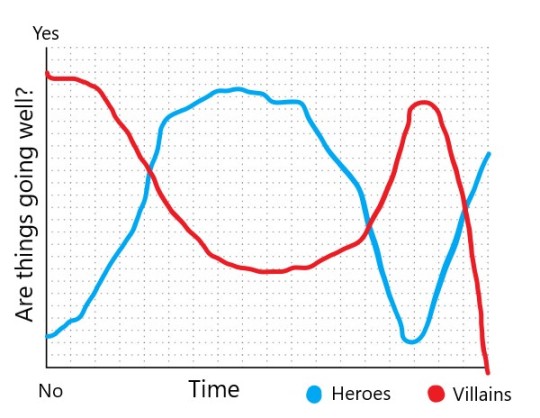
Whether things are going well for one side is inversely proportional to the other. During the Darkest Hour, when the hero is at their weakest, the villain is at their most dominant.
Wait… isn’t Silco the villain of Arcane? Not to be too blunt, but he’s having a shit time. Things are falling apart for him just as badly as for everyone else.
That's the trick. Caitlyn and Vi are suffering. Jinx is suffering. Silco is suffering. Jayce is suffering. Viktor is suffering. Zaun as a whole is suffering. There is only one party in the whole story that isn't suffering, that actually is benefitting from this horrid state of affairs...
EKKO AND HEIMERDINGER
Kidding. They're not really a part of this dance. A big part of Arcane's theming is that acting to help people without an agenda is simply more virtuous than fighting for any invariably-flawed nation that innately perpetuates the cycle of violence.
No, the side that is doing fine is the other that is conspicuously absent from my two prior lists. While the characters that make up its leadership are experiencing personal Darkest Hours, the organization itself is essentially on top of the world, having just scored a huge victory and getting set to bring the war to an end before it even begins. I mentioned how poor the situation for the Undercity looks, but not its counterpart.
Piltover.
Wasn't it so that Piltover started this whole mess? Didn't their oppression cause the revolt that orphaned Vi and Powder's parents? Isn't it their actions that drive Silco to ever greater extremes? Isn't it their normalized political backstabbing that causes Jayce to sacrifice his principles because that's the only way to get ahead? Isn't it their corrupt police force that lets Silco operate his drug empire with impunity?
Silco might look the part. He might be the most personally evil character, might be the one who causes the most misery for our main protagonists Vi and Powder.
But structurally, the shining city of Piltover, its political machine, and its Enforcers are the actual villains of Arcane.
#arcane#darkest hour#writing#silco#piltover#zaun#piltover and zaun#heroes and villains#good writing#just realized this#still noticing new things#even two full years later#i love this show#has someone said this before?#long post
219 notes
·
View notes
Note
Just three words. ✨ Soft Yandere Aizawa✨
Okay, this one was in my inbox for a very long time. So first of all, sorry for the long delay. Second: before proceeding, please read what I want to tell you: I am not particularly into Yandere narratives. Besides, I had trouble picturing Aizawa's character in this specific scenario because I don't see his character as one that would act as a Yandere. So, I am sorry if this sucks or if it isn't exactly what you asked for. I tried my best to place him into a Yandere narrative without losing his character essence.
.
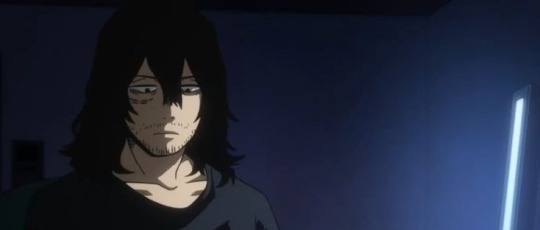
Masterlist | NSFW / + 18 only
Pairing: Aizawa × Reader | Words: 2 K
Tags: SFW/NSFW, soft Yandere themes, headcanon.
cw: Stockholm syndrome.

- SFW part -
You caught Aizawa's attention with your unique and powerful quirk. Aizawa becomes fascinated by your abilities as a vigilante and sees your true potential as a hero.
During his patrols, he would frequently encounter you, your paths occasionally crossing as you both maintained the peace and protected others. Aizawa's initial interest in you is sparked mainly by your skill and dedication, further developing into a genuine admiration for your abilities.
His fascination with you would grow more over time, and as an expert in stealth and surveillance, he would subtly observe you from a distance. He would track your routine and patrols, skillfully remaining undetected in the shadows.
Though he kept telling himself that he would meet with you "occasionally," his true intention was to keep a close eye on you, gaining further insight into your personality, strengths, and weaknesses.
And on a fateful day, a villain attack left your quirk temporarily weakened, rendering you vulnerable and unable to defend yourself effectively. So, Aizawa doesn't think twice before intervening, saving you from further harm.
Recognizing your injuries and weakened state, he would then convince you to seek refuge and protection with him, assuring you that he would take care of your wounds.
This accident catalyzes his plan to keep you close. He didn't even need to kidnap you! But, if you had not suffered the attack, though, maybe he would fake one anyway. He would be subtle.
Once you were in Aizawa's custody, he would treat you with surprising gentleness, providing genuine care and ensuring your well-being. He understands the importance of earning your trust and making you feel safe in his presence.
So, he would never restrain you. Instead, Aizawa would keep you locked in a comfortable space, his actions driven by his desire to gain your trust and affection. He is cautious not to cause you unnecessary harm or distress.
However, you would inevitably become resistant to the situation, yearning for freedom and wary of Aizawa's motives.
And he would try his best to respect your boundaries and acknowledge your desire to escape, but he would maintain a firm stance in preventing your departure.
He would make you stay through subtle manipulation and persuasive tactics. He would never use aggressive force, even if you tried to escape aggressively.
He would only erase your quirk and evade your attacks until you were tired of fighting but would never attack you back.
Aizawa would constantly try to balance his desires toward you and your autonomy.
And as time passed, Aizawa's genuine care and occasional displays of vulnerability created a complicated mix of emotions within you. While you may not fully reciprocate his feelings, you begin to recognize a genuine connection and understanding with him.
But tension would inevitably rise as your desire for freedom clashes with Aizawa's determination to keep you close. Anyway, he continues to demonstrate acts of kindness and understanding even when you call him names or tries to attack, only to be left tired again without causing him any scratch.
As he pursues your affection, Aizawa may go out of his way to fulfill your needs and show you a softer side. He would attempt to break down your resistance through carefully thought acts of kindness.
He pays attention to the more discreet details, providing you with your favorite meals, engaging you in conversations about your interests, and even bringing you books or movies you might enjoy; Though these gestures are not grandiose, they display subtle moments of care that eventually begin to form a foundation of trust.
With gestures and conversations, Aizawa allows glimpses of his softer side to shine: During quiet evenings together, he shares stories from his past, revealing vulnerabilities and personal struggles he faced.
He would try to create a space where you felt safe to open up, fostering an environment of mutual understanding and empathy. He would encourage you to voice out your worries and distresses, even though he would get quiet and avoid the topic of letting you go.
Over time, he aimed to create an emotional bond based on trust and shared experiences. Through acts of gentleness and patience, he hoped to impress you and demonstrate his capabilities as a protector and a provider.
Aizawa is patient and aware that your journey toward reciprocating his feelings will take time. He also recognizes the importance of granting you space for self-reflection and growth. So he would do everything you asked: leave you alone, bring you some specific food, not talk to you, or to talk to you, tell you a story, listen to you, anything, except for letting you out.
However, Aizawa is not without his internal struggles. He battles with his conscience, questioning the ethics of his actions. He grapples with the conflict between his genuine care for you; and the fact that your relationship began under non-consensual circumstances.
The turning point in your relationship arrives when you start to see glimpses of Aizawa's vulnerability: He shares his fears, his insecurities, and his past failures, exposing his humanity and flaws.
And it is through these shared vulnerabilities you begin to connect with Aizawa on a deeper level, seeing him as more than just your captor but as a complex individual with genuine emotions.
And as your bond deepens, Aizawa becomes even more attuned to your emotional shifts and moods. He learns to anticipate your needs and provide stability and support. During moments of vulnerability or distress, he offers a comforting presence – allowing you to lean on him for solace and reassurance.
Gradually, your resistance toward him begins to wane, replaced by a complex mix of emotions. You may find yourself drawn to Aizawa's unwavering dedication to making you comfortable and cared for, seeing how the genuine connection you have developed over time.
However, remnants of your initial resistance may linger, reminding you of the complex dynamics that brought you together. Anyway, Aizawa remains committed to maintaining a delicate balance. He respects your autonomy and your desire for freedom, yet he also nurtures your affection for him.
- NSFW part -
He would never sexually touch you without your consent. However, he would indeed stare at you intensely sometimes, but he wouldn't do more than that. And, when you would catch a sigh of him ogling your body, he would immediately turn his vision away with his face bright red.
He admires your body with great appreciation. He would not comment on that for fear of making you uncomfortable, but he frequently wondered what you had under the clothes he provided to you;
He often imagined what it would feel like beneath all those clothes, the skin underneath, and the curve of your waist. His body would ache from wanting more than just that sight.
While he would not allow physical contact, he would fantasize about being able to explore every inch of your body. And so, he would always find ways to sneak glances or peek inside your room.
His mind would wander as he envisioned you naked and spread open for his perusal, feeling aroused at the possibility that he could possess you, even if you weren't aware of it.
In those fantasies, he would gently caress the parts of your body he desired most. Carefully, he would trace each contour, savoring the sensation of feeling your softness in his palms, tracing circles against your inner thighs, lingering over your stomach, chest, and shoulders.
His imagination would then drift off, imagining scenarios where you would finally allow him access to pleasure, and make him feel complete, finally satisfied, leaving him weak and limp.
He often fantasizes about you having sex with him, giving yourself freely as you would take his hands in yours, guiding him through your soft body, kissing him with passion;
When your lips parted, he would eagerly follow you until he could kiss you again. And, when finished, he would pull you into his arms, burying his face into your neck, breathing deeply in your scent.
Then, when you finally started to see him beyond your captor, he would always be surprised by any small show of affection coming from you. For example, he would be speechless if you gave him a simple peck on the cheek.
Or, when you started to smile at him, he would be ecstatic. Sometimes, you would give him a pat on the arm; or maybe a rub on the back when he would open up to you.
And once you saw past his walls and started to develop a mix of feelings toward him: he could tell. You would smile more and look at him differently.
Sometimes he would look at you and smile, knowing that you were starting to have feelings for him because you were changing.
You would not flinch away when he would touch your hand anymore and wouldn't mind if he sat close to you. Sometimes, you would even lean against him when he was around.
The first time you kissed him on the lips was when he was upset with you for wanting your freedom. It was sweet and passionate, conveying a sense of safety and warmth. You wanted him to know that you did want to be free, but you weren't sure if you wanted to leave him anymore. You had started to find comfort in your surroundings while living with Aizawa.
And as time passed, you eventually realized how attractive he seemed to you. You noticed his sharp features, his sharp gaze, his hair, and the curves of his toned body.
You became fascinated with how his eyes would light up when he talked with you. And then, you would find yourself leaning closer, wanting more.
You also got bolder, teasing him as you explore your new boundaries. Your physical intimacy drastically improved as you opened up and trusted him more. He then started taking risks, going further, initiating physical contact, and exploring those new boundaries.
In turn, you enjoyed the new closeness that came with a change in atmosphere, a strange yet good feeling of security and belonging.
It was this sense of closeness that prompted you both into the process of bonding. You slowly became more intimate, and it started to feel natural for the two of you.
One day, when you were enjoying a peaceful evening together, he reached behind you and gently started playing with your strands of hair as you rested your head in his lap.
As he played with them, he brushed against your ear, throat, and collarbone. Then, he stopped. He let out a frustrated sigh before pulling you close and planting small kisses over your cheeks, chin, brow, eyelids, nose, forehead, and mouth. And then you were lost in an instant of pure bliss.
You couldn't remember exactly when it happened. All you knew was that you had only a few moments of clarity and could see what was happening, feeling the heat rising within you.
He would always ask you if he should stop or ask for permission to go further whenever you flinched. But you rarely did that, so he would continue doing whatever pleased the both of you.
He would gently massage your shoulder blades and back. His hands would then hold onto your waist. Sometimes, you would feel his lips on your neck, trailing down, sucking on the sensitive skin, and leaving tiny hickeys.
He liked to mark you, but he would be gentle on how he would do it. He'd start with tiny nips and suckles, then gradually go down until he got close to where he wanted most.
Afterward, he would kiss you harder and deeper, trying and succeeding in eliciting a good reaction from you. The longer he would go on, the hotter you would get.
As time progressed and you became really intimate, he would fuck you with no shame, giving you more pleasure than ever before until you moaned his name. You would gasp and squirm, and he would always ensure you climaxed every. Single. Time.
He would shiver every time he heard you moan his name. He didn't know why, but it always caused a deep excitement in his chest and heart.
He would come undone in seconds as you called out his name. And then he would hold you tight, whispering soothing words as you continued gasping and moaning in delight for a while after.
Eventually, you started to love that sound and how he felt pleasure from just your touch and noises.
And soon, you realized that nothing would prevent you from loving him back.

Likes, reblogs, and comments are appreciated! Check the fixed post for requests & more details!
#aizawa shota x reader#aizawa x y/n#aizawa x you#bnha aizawa#my hero academia aizawa#aizawa x reader#mha aizawa#bnha fanfiction#bnha headcannons#mr aizawa#bnha x reader#bnha#aizawa shouta#aizawa smut#aizawa sensei#aizawa fluff#yandere aizawa#mha fanfiction#mha headcanons#mha smut#aizawa headcanons#mha#boku no hero x reader#boku no hero headcanons#boku no hero fanfic#boku no hero fic#my hero acedamia#aizawa shōta#aizawa shota smut
589 notes
·
View notes
Text
Stephanie Brown ACTUALLY having the character arc that fanon pretends Jason Todd had (plus a defence of canon Jason)
What I'm really saying is that Stephanie Brown is underappreciated, Jason Todd is often misinterpreted, and, though it should go without saying, ignoring canon is poor media literacy. So let's actually analyse canon and get to the bottom of what the stories are trying to say and how they use their characters to tell this, as opposed to just which character should we stan.
I'm arguing that Stephanie Brown's story actually features a redemption arc that sees her transform from a violent, almost murderous teenager into the most unwaveringly hopeful of heroes and that Jason's story is about a villain who we're meant to empathise with to expose the cracks in the Batman's heroic facade; a Frankenstein's monster if you will. Here's a numbered list:
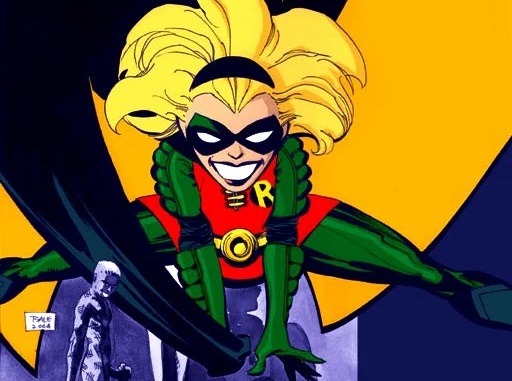
Part 1: Outgrowing Violence, Anger and Murder
A big part of Stephanie Brown's growth in canon is her learning not to kill or use excessive force. But it's not as simple as just killing is wrong, don't question it.
Let's begin with the narrative's relationship to violence, anger and murder. Why doesn't Batman kill? Because "[those] who [fight] with monsters might take care lest [they] thereby become a monster. And if you gaze for long into an abyss, the abyss gazes also into you". If he kills, he's playing god, choosing who gets to live and die. No one deserves that kind of absolute power and absolute power also corrupts. Batman doesn't want to lose sight of himself or his cause. Deliberate murder is treated VERY negatively in the Batman mythos.
Enter Stephanie Brown.
Stephanie was a working class latchkey kid who grew up on the wrong side of the tracks. She had an abusive, criminal father, who was in and out of jail, and a mother struggling with addiction, who Steph became a carer for at just 15. Steph also became pregnant with the child of her horrible ex. At 16, she gave birth to that child and had to give her up for adoption. Steph is also a survivor.

The world was never kind to Steph and left this teenager with a hell of a lot of bitterness and rage which her vigilante career became an outlet for. You can tell by the way she fights since Steph fights DIRTY; she'll tug hair and spit in your eyes and strike below the belt and catch a kick to twist your ankle and dislodge your already broken nose. On the one hand; the narrative tells us Steph is resourceful. She's 5'5", 130 lb and has zero powers, but can always find an opening even when going up against Gotham's grizzliest. It's telling that quick thinking, savviness and spontaneity become her thing when she becomes Batgirl; Steph is the wild card. On the other hand, she was a real diamond in the rough and a complete loose canon. In her first arc, it's Batman who stops her from making the biggest mistake of her life; killing her dad. To deliberately kill; to play god, is to lose yourself, remember. Her first arc is about not being defined by who your parents are and about not giving up on yourself. Batman basically tells her, there's hope for you yet Stephanie Brown, by getting her to spare her dad. And she does. And so began her superhero career.

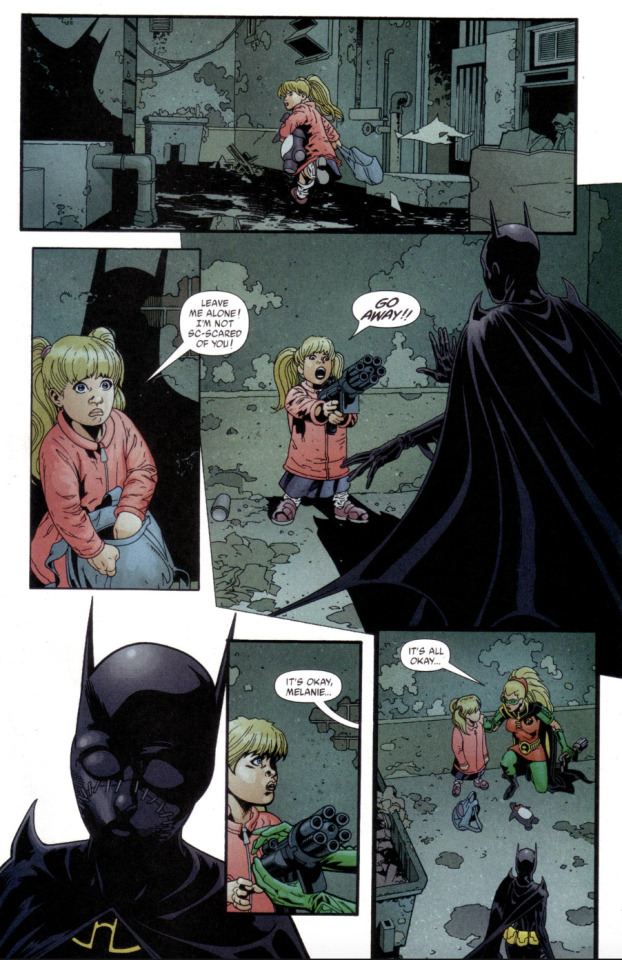
Nonetheless, it's never that simple. Steph is still a bitter, angry teenager, no matter how many jokes she cracks. It becomes a personal crusade when she, now Robin, discovers that The Penguin is using children as runners. It takes Cassandra Cain to stop her from inflicting anything she may regret.
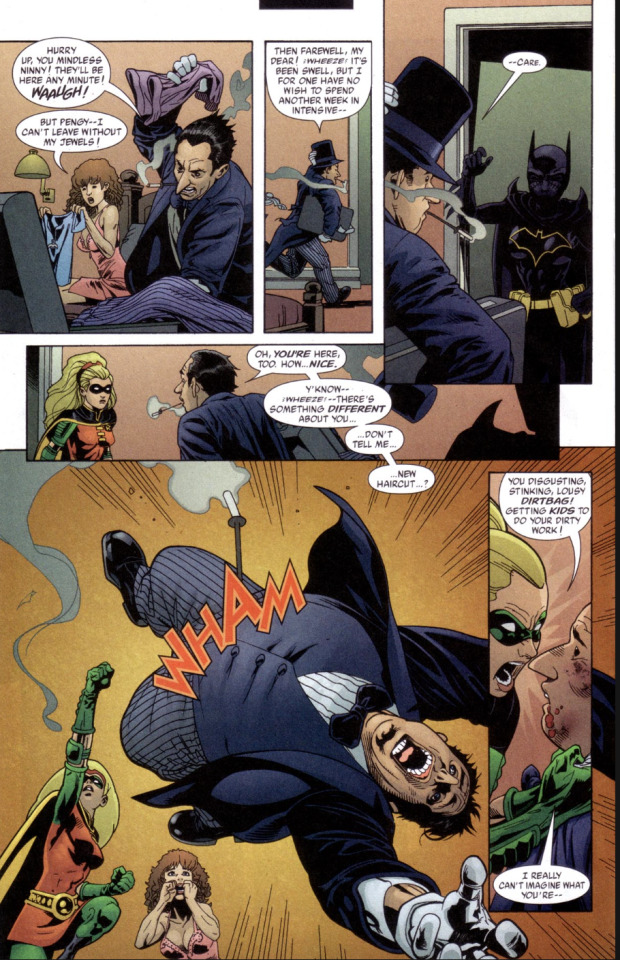
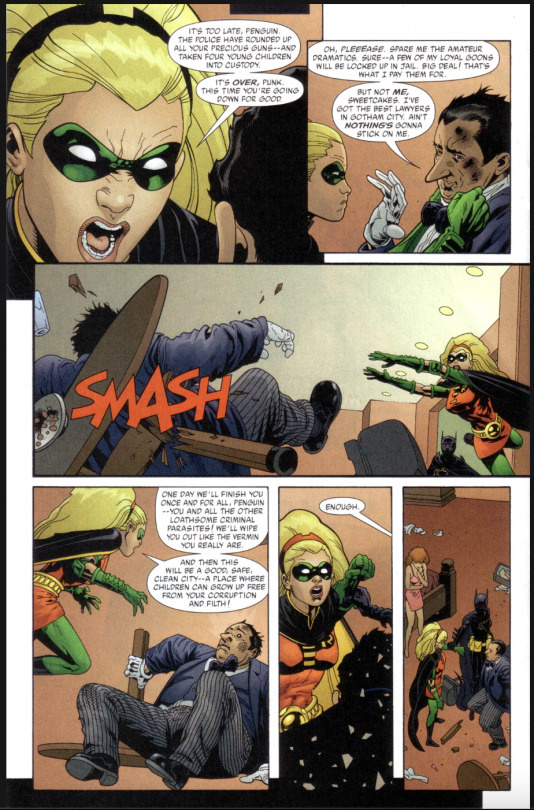
The narrative wants to show us how cruel the world can be and that it isn't black and white, either. The story ends with an angry Stephanie lamenting "why". It's a "why" she is asking herself too. Why does she do what she does? And it informs us that she, and maybe us the reader too, still have a lot to learn. Murder's not the answer but what is?

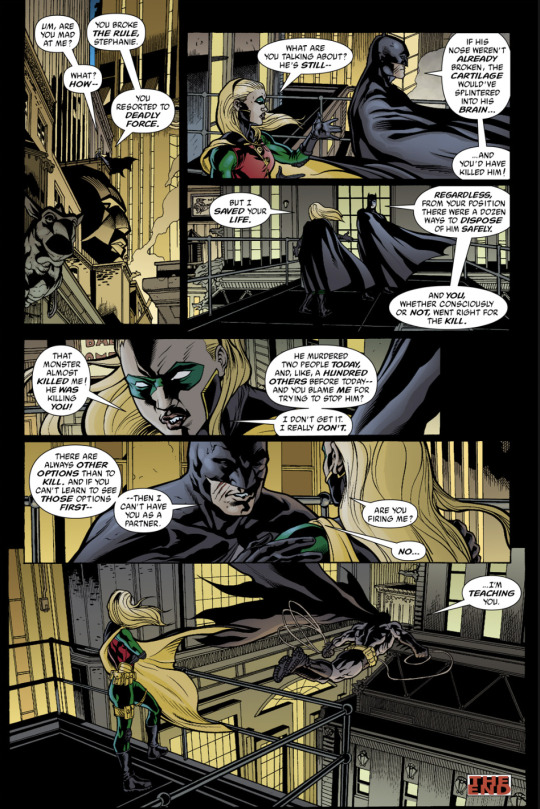
Stephanie later saves Bruce by almost murdering serial killer Victor Zsasz. Bruce reprimands her and she cries, quite honestly, "I don't get it, I really don't", following on from where we left off in Batgirl. "There are always other options than to kill" asserts Bruce, forget not being on the same page, they're reading different books. The thesis of the story is what Bruce should have told Steph when she was an angry 15 year old about to murder her dad; "[those] who [fight] with monsters might take care lest [they] thereby become a monster". The world's cruel, Steph, but that doesn't mean you have to be too. "Are you firing me?" "No, I'm teaching you".
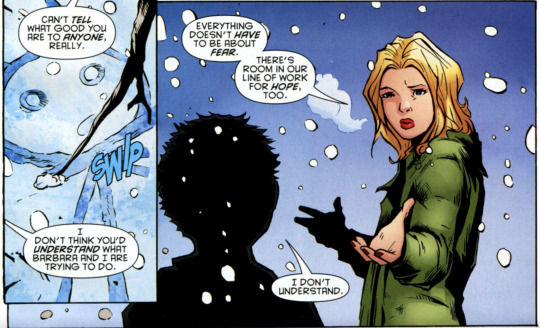
Over 2 years down the line, an around 19 year old Stephanie, establishing herself as the new, hoping-inspiring Batgirl, is now teaching a brash Damian Wayne what she's learned.
"To murder or not to murder" is just a plot device to the themes of overcoming your own anger at the world's cruelty to contribute good, coming to terms with shades of grey, not giving up on yourself and staying hopeful in the face of adversity and horror. These are Stephanie's arcs and as a consequence, she goes from would-be-murderer to Gotham's cheeriest caped crusader.
Part 2: Double Standards and Second Chances
Another huge part of Stephanie's story is her overcoming double standards and doubters, to earn her own second chances. Her resurrection and rise to the role of Batgirl were choices made to hammer home this theme; it's never too late to turn things around.
There's some juicy metatext to analyse here too. DC editorial's treatment of Stephanie during War Games was horrific and panned by both fans and writers. To reperate for these harms, Steph was retconned back to life and then made Batgirl during Batman: Reborn. Here's a quote by Batgirl (2009) author Bryan Q. Miller on what his run aimed to bring out of Steph:

The whole point of Stephanie's resurrection and take over of the Batgirl title was to give her a redemption arc.
In text, Stephanie was unfairly treated too, notwithstanding that she was brash and had a massive violent streak in her Spoiler and Robin days. Tim Drake constantly condescends her and tells her to give up vigilante life, even though she was ALWAYS a match for Tim according to Convergence: Batgirl. Cassandra Cain constantly underestimates Steph. Bruce Wayne tells his allies to cut off ties with Steph and then later fires her as Robin for DISOBEYING HIM as if that's not the first thing Dick Grayson ever did as Robin. Barbara Gordon tells Steph she has a death wish. Dick deems Steph too reckless (moments before he resurrects a zombie Batman). And Damian is an entitled brat who gives her a hard time for no reason. Everyone doubts Stephanie and it generally says more about the doubter than it does Stephanie.
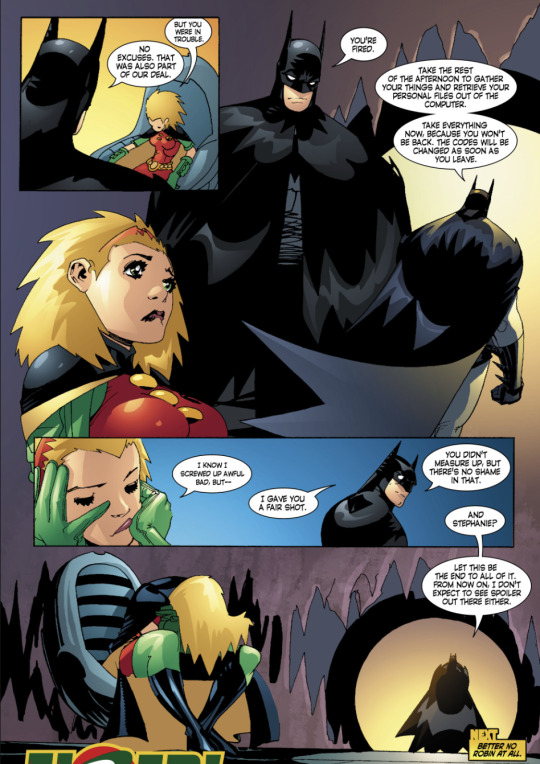

Stephanie was never great with authority or criticism so she still went out there and earned her second chance. And it felt rewarding when her doubters came around too.
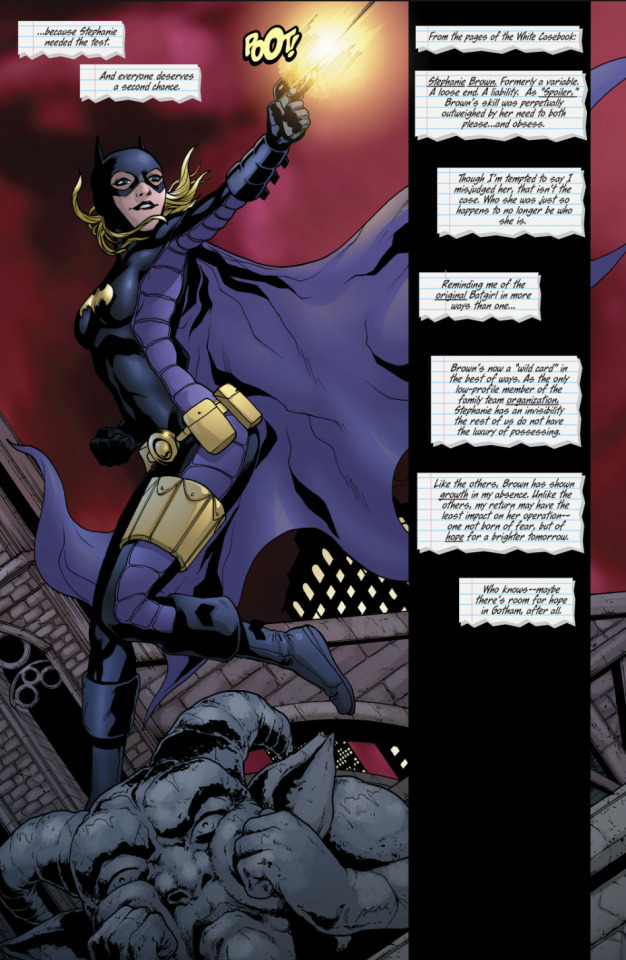
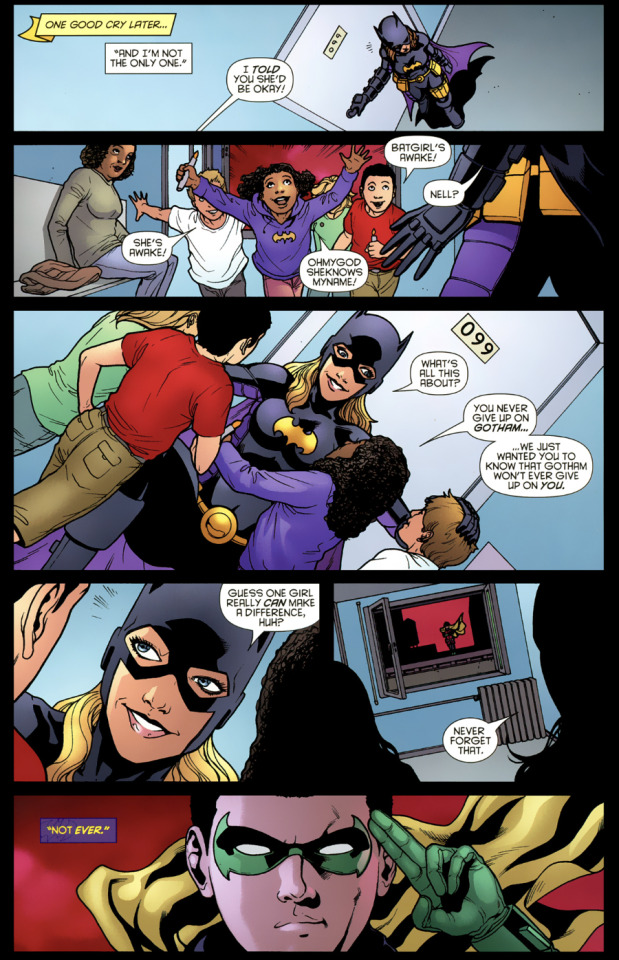
Stephanie was brought back from the dead to be redeemed and man did she take that chance!
Part 3: What is Jason Todd's Story Meant to Tell Us and My Defence of Canon Jason
Jason Todd returns from the dead as a ghost of Batman's past; he is the living embodiment of Batman's greatest mistake who couldn't stay buried and is back to haunt him. He's a character we are meant to empathise with but he's a villain nonetheless. He's not irredeemable but for the most part his story is not really about redemption. Succinctly, it revolves around the idea that "we are each our own devil, and we make this world our hell” to quote Oscar Wilde.
When we first meet the resurrected Jason, he's a cold-blooded murderer who's slinging guns and using The Joker's old moniker. These choices are made to emphasise that he went down the wrong path; he's breaking Batman's "don't play god" rule and his actions become eerily closer to those of the Clown Prince of Crime than Batman's. In fact Nightwing and Batman spend some quality time together in the next two issues because Nightwing is the foil to the Red Hood; he's what Bruce considers his greatest success. Remember that thing about "those who [fight] with monsters might take care lest [they] thereby become a monster"? Well Jason DID become a monster. And if he's the monster, then Bruce Wayne is Frankenstein.

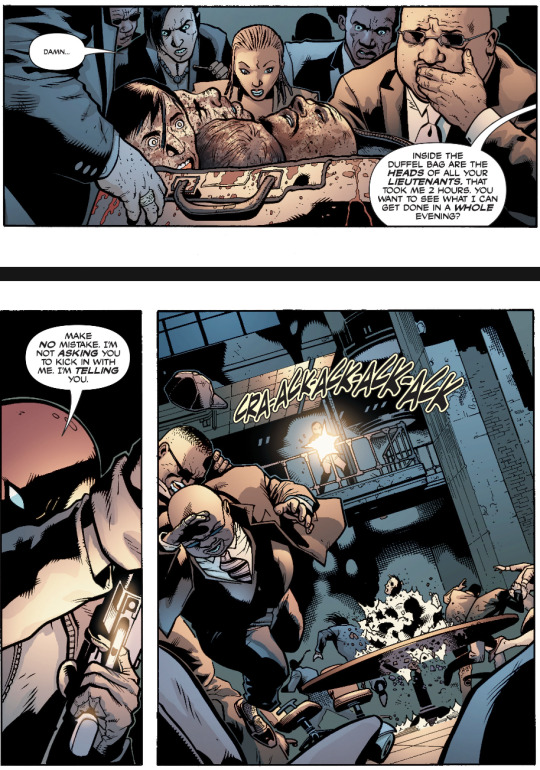
We're not supposed to think "yes, kill the The Joker, Jason", we're supposed to think "good god, please Jason, it's not too late to turn your life around". Here's Dick and Jason being the exact opposite of each other, an issue apart.
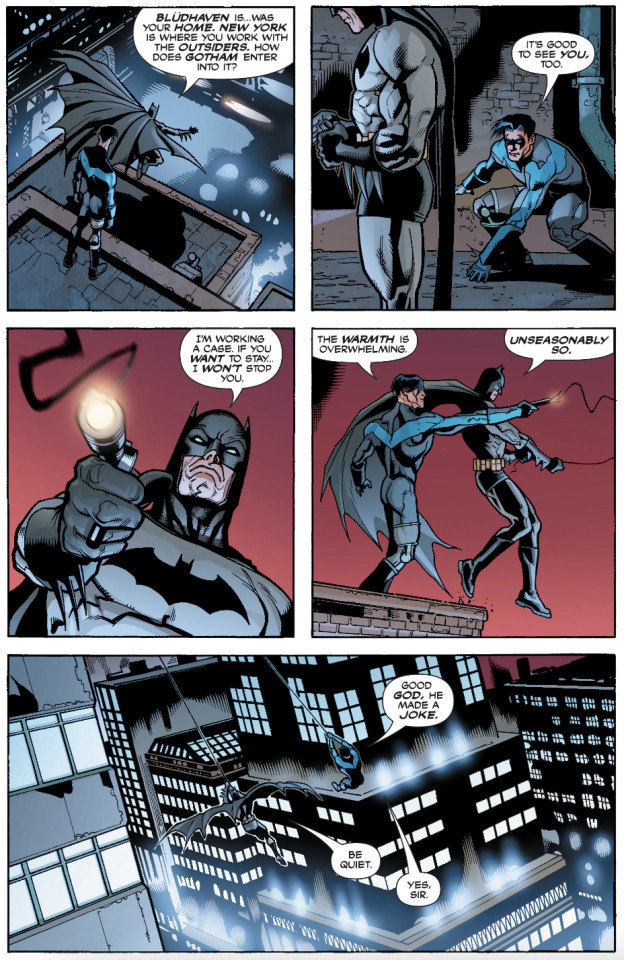

So what was Jason's villainous return trying to say? For one, that people are the products of their circumstance, lest we forget Jason was once an eager and studious Robin who just wanted to be part of something greater when life, but specifically Bruce, sent him awry. This is also a story about Bruce which tells us says that our mistakes have consequences that don't stay buried, and that we will always be forced to reckon with our histories or it becomes everyone's problem. This next panel shows this best. All of Jason's killing and torture and fear-spreading and chaos does not come down to some "murder or not to murder" debate, it comes down to his relationship with Bruce. He is the monster that Frankenstein created who's back to haunt him and no one is safe.

Jason's initial Red Hood arcs were never supposed to pose the question "should Batman kill The Joker or not?". The answer is no and always has been. They are supposed to show us how Bruce's poor fatherhood of and partnership with Jason Todd led to all this horror. And Bruce can't turn back the clock, he has to reckon with the consequences of his actions in the present or more people will get hurt. It's significant that these first arcs don't end with Jason returning to the manor and seeking help surrounded by family.
We then see Jason and his issues with Bruce threaten the lives of others like when he beat Tim half to death twice, tried to blow up Mia Dearden and then tried to become a murderous, gun-touting Batman after Bruce's "death".
Once Dick Grayson becomes Batman, the narrative sheds a bit more light on how Bruce's Frankenstein created a monster in Jason; Bruce wanted Jason to be another Dick Grayson.

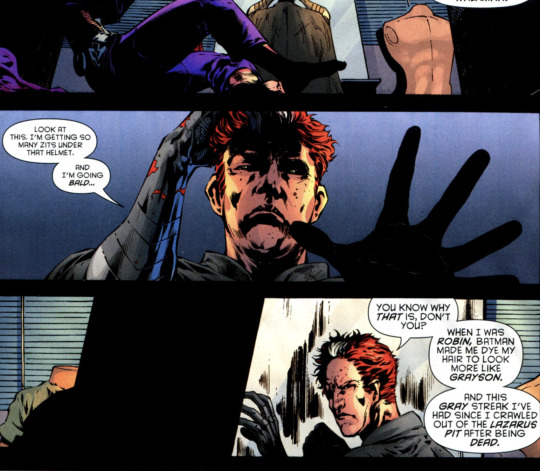
The red hair is a perfect metaphor. Jason is naturally red-haired and he is now balding because Bruce made him dye his hair black so he'd look like Dick as Robin. That sums it up for me. Bruce really created his own demon here and Dick, as the new Batman, is trying to make amends with the sins of the Batman's past. Jason's a great choice for a Dick Grayson villain because of their histories, considering Dick Grayson is the legacy Batman.
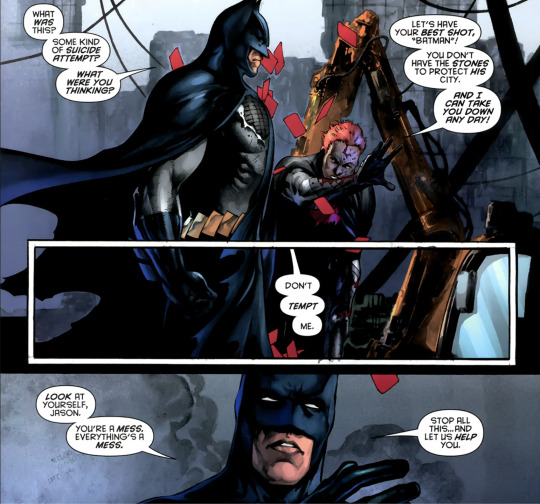
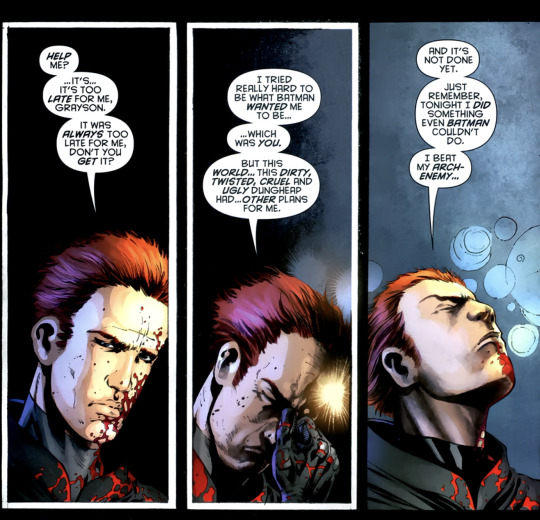
"I tried really hard to be what batman wanted me to be...which is you." Jason tells Dick.
That line is so painful and way more recognisable and relatable than anything fanon has produced.
"But this world...this dirty, twisted, cruel and ugly dungheap had...other plans for me."
Look no further, this is who Jason Todd is.
That's a powerful story if you ask me, and this is why I like Jason Todd as a character; a villain I pity deeply, who is portrayed as a product of their circumstances without diminishing their agency and who makes me see the cracks in the hero's facade because they are the monster our "hero" created. He's also a very nuanced foil to the ever-shining light that is Dick Grayson. The appeal to Mary Shelley's Frankenstein isn't that the monster murdered people. I also would never swap canon Jason out for, I dunno, Wayne Family Adventures Jason who's the amalgamation of 3 or 4 common fanon tropes. This is my two cents.
#stephanie brown that ball of anger and vengeance that we saw grow into one of the most well-rounded capable and cheerful bats around#stephanie brown#vengeance is purple#fanon vs canon#jason tood#robin#batgirl#the spoiler#red hood#batman and robin#dc comics#comics#metas#batman#batfam#wayne family adventures#bruce wayne#dick grayson
350 notes
·
View notes
Text
Best of the Reptiles in Media - 01 - Godzilla (Monsterverse)
I figure that while I'm using this blog, I might as well post my ramblings on a subject dear to my heart: That being the representation of reptiles as characters in media. And not just villainous or vile ones like we're so used to. I'm talking about ones that inspire me. The ones that are legitimately compelling to me. And these posts are an excuse to espouse why.
Plus, it's just fun. You can thank the likes of @tyrantisterror and @bogleech for inspiring me to do these.
So who better to start with than with the lizard who's been an inspiration to me for almost my entire life. That being the one known as Gojira. AKA...Godzilla.
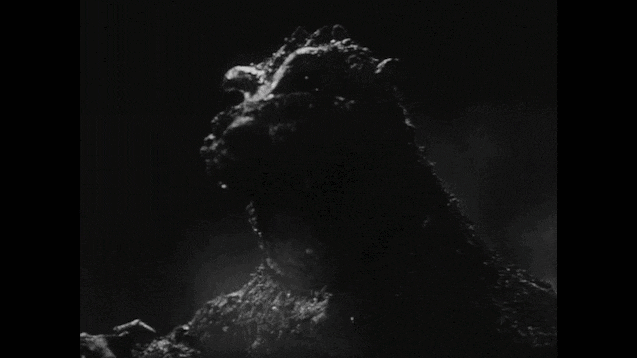
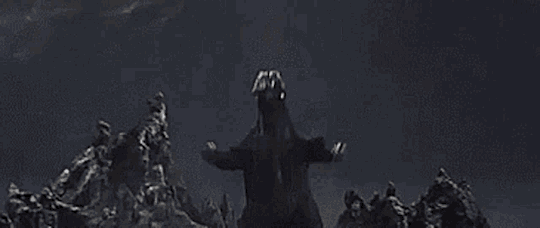
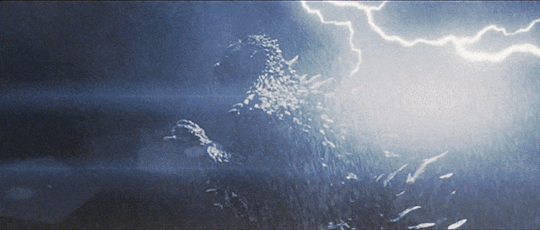
This is the one character in these posts who probably needs no introduction. Ever since his debut in 1954, the walking embodiment of the horrors of nuclear war, among other things, has been nothing less than an icon. This is the beast people think about when they hear "giant monster" or "kaiju". This is truly the King of the Monsters.
My introduction to Godzilla was a children's book called "Godzilla on Monster Island". It was a fun read full of neat monsters living together and teaming up to stop an evil plan. And it left me wanting more. I wanted more stories of these fantastic yet friendly beasts being friends and living together while having fun adventures. Little me was a bit disappointed to find that Godzilla spent more time fighting his fellow kaiju and trashing cities instead.
The truth, as I would find out, was that Godzilla is never just one thing. He is a fun defender of the Earth. He's the terrifying consequences of our tampering with both nature and science. And in recent memory, he's been a lot of other things. But most of the time, he's either hero or mankind's hubris on two legs. To me, he was a giant dinosaur that could fire thermonuclear breath, and that was all that mattered. It was after hearing about the historical significance of him that my respect doubled.
Back then, I would tell you that my favorite Godzilla from a design standpoint was the 2002 version. Personality wise, almost every Showa appearance post-1964.
But in 2014, everything changed. In came a Goji that seemed to have everything I could ask for. So, we're going to look at the one that resonates with me the most. The Monsterverse version.
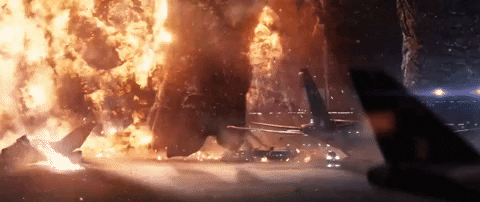
That right there is perhaps one of the most awe-inspiring entrances I've ever seen in a cinema.
Before the release of Godzilla (2014), the franchise had entered something of a slump period. The last film was all the way back in 2004, and sadly, the kaiju genre was still something of a niche thing growing up. Here in America, you either liked superheroes or real-life celebrities as a kid. If you liked monsters, let alone giant monsters, you were one of the weird kids. That, or one of the kids who never lost their passion for dinosaurs. But those were rare.
Then Gareth Edwards unleashed this film, and while one could argue that Pacific Rim (2013) got the ball rolling, THIS ultimately resurrected the entire franchise of the Big G, and got him a degree of general respect from most film-goers (so long as you ignore the irritating internet drama regarding screen-time back then).
But let's get to the meat of this post. Why is this Godzilla so much better to me than the rest? A few things, really.
First off, there's Godzilla's role in the Monsterverse's narrative. For the most part, he is a guardian of the natural order, a means of bringing balance to imbalance. He is a metaphor for how nature is capable of righting itself, and how we either have to deal with it, or live with the consequences. In practice, Godzilla ends up going up against almost every monster, most of which are only a threat because we awakened them/created them. Yet despite this, he doesn't go out of his way to destroy us. He's not mindlessly destructive or particularly vengeful either. He knows we're a part of the world too. We just tend to grate a bit more on his nerves because of how much we screw up. If there's one thing this series isn't afraid to show, it's that...well, "the arrogance of man is thinking nature is within our control, and not the other way around."
Design-wise, this is one of the best Godzilla's around. He's bulky, has a killer stare, and there's something oddly endearing about how...well, meaty he is. He's like if my aforementioned previous favorite design, the 2002 one, put on both a lot of muscle and weight. It also ties into his fighting style, said to have been inspired particularly by bears. Even the sounds associated with him are amazing. From that hype-inducing charge of his thermonuclear breath to what might be the best rendition of the classic roar.

Then there is the body language. This Godzilla's usual gait is slow, almost plodding at times. He shows clear signs of exhaustion in some scenes. What he goes through is hard, and his job is even harder, but he still does it. It really helps sell his personality most of the time.
Part of why I like the Monsterverse so much is that, for the most part, the kaiju are treated as characters in their own right (that's not to say they weren't in previous iterations, far from it, but it's a bit more pronounced here than most of the post-Showa stuff). Sure, some films in this verse are better about it than others (more on that later...), but I like how you can glean what Godzilla is thinking of just by looking at his eyes. Of particular note is how they widen in "Godzilla: King of the Monsters" when Ghidorah gains the upper hand during the final battle, his absolute sneer of anger in the first movie when the male MUTO approaches him, or...this.

This scene. This one right here encapsulates so much of what I love about this iteration. Where Godzilla, dazed and thoroughly battered by both the fight with the MUTOS and having a building fall right on him, locks eyes with a tiny little soldier. You see a sense of tiredness, of pain, of acknowledgement, and maybe even a little wonder. This is not just some mindless beast fighting for its turf. It's a thinking being. And he's hurt. The most powerful creature on the planet isn't invincible, neither on the outside and definitely not on the inside.
And you know what? I've been there. There are times where I feel like I'm carrying the weight of the world, that there are things too heavy to bear, and its suffocating. Godzilla constantly shows throughout the Monsterverse that his job as a living balancing act is wearing on him. He gets put through so. Much. Crap. From getting buildings dropped on him to being personally dropped from a distance above the clouds to watching his symbiotic partner/mate die, it's almost unfair how we're expected to not really sympathize with him as much as...I'll get to that later.
But he never gives up. Despite all the pain and fatigue, he gets back up, and he fights. And he fights. And he continues until the deed is done. Someone has to rise to the occasion, and it might as well be him. If not him, then who?
That is the biggest reason I resonate with this Godzilla. His awe-inspiring design is one thing, but he gave me the strength to persevere. I don't give up, because he never did. Never before had the Big G been such a hero to me. Such that in 2014 I found myself silently sobbing to myself when it seemed like he was dead near the end even though that was clearly not the case. It's hardly a surprise that I based my personal Godzilla AU on him, albeit with the more sympathetic traits dialed up. Stuff like this made G14 and KOTM some of my favorite kaiju flicks...
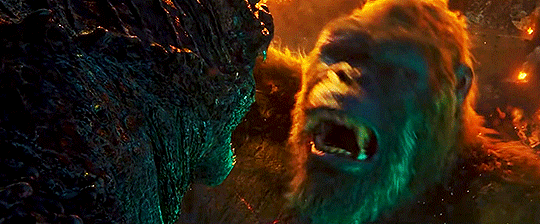
...which made it more than a little disappointing when Wingard took the helm and basically said "screw that, this is about the monke now!" Yeah, GvK is the weakest entry in the series for me for a reason. Godzilla's more redeeming qualities are buried under a narrative that clearly is not interested in giving him the time of day or even the benefit of a doubt. Both it and it's successor, GxK, are Kong movies through and through, and that means poor Big G is put out of focus.
I cannot tell you how much I HATE this idea that the only way a monster can be relatable is if it either looks almost just like us or is really cute. Yes, I understand the universal appeal, but they had such a good thing going for Godzilla! And they throw almost all of it away just so that they can make Kong look better by comparison.
Credit where it's due, these issues are slightly improved in GxK. It's not only firmly established that Godzilla is an overall benefit to the world for keeping the other Titans in check, but we get some interesting bits with him like how he instantly responds and prepares to answer the call of the Iwi and help them. It shows that despite his tenuous relationship with humans, there are ones he clearly gives a lot of thought to. And there's also how he makes the Roman Coliseum his own personal bed. Not only is it kind of hilariously adorable, but if you remember how in KOTM he had his own man-made temple, you get the impression that he has a bit of homesickness. That's the kind of thing I like to see! More of that and less "he's only ever angry and he only ever fights, character is for primates only".
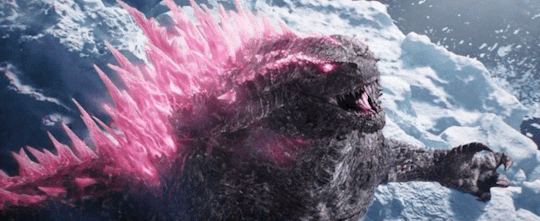
Also, while the Evolved design has nice details, I WANT THAT GUT BACK! it just looks weird otherwise with that disproportionately skinny waist.
But thankfully, our prayers might be answered:
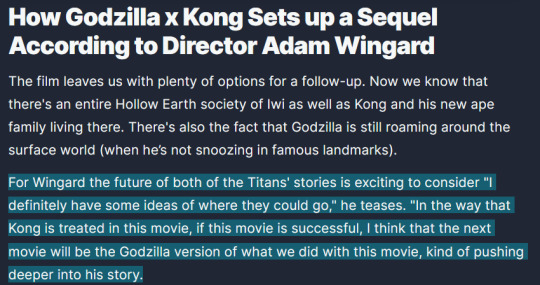
With GxK's roaring success (ha!), it's more than likely that the next Monsterverse entry will finally give Godzilla an overdue character arc that doesn't begin and end with "destroy everyone and act big and scary and nothing else". Just please make sure that he doesn't have to die to get that. There are plenty of ways you can make us invest in the guy's story without having to kill him. I WANT to see more of that emotional vulnerability teased across the movies. I want to see him come to terms with how he's been going about his job. And more importantly...I want to see a more explicit Mothzilla scene. A nuzzle and everything. But that's just me.
Whatever the quality of his current status, nothing is taking away how much I love this version of Godzilla. He's taken me out of some very dark places, and for that, I say long live the king.
Also, he brought Mothzilla into the public sphere and every Mothzilla pic made since is the cutest thing ever, so I just love him even more.

#best of the reptiles in media#ramblings#godzilla#gojira#monsterverse#godzilla 2014#g14#godzilla king of the monsters#godzilla vs kong#godzilla x kong: the new empire
60 notes
·
View notes
Note
So what exactly is it about Merlin and Arthur that make them so ship-worthy, sparking million-word fanfics? Why does it remain one of the most popular fandoms? Why do you never seem to tire of them as a writer? (Not that I am complaining or anything. I just find the loyalty fascinating considering how much new stuff is coming out every day).
Bradley and Colin and their chemistry together as performers certainly is an important aspect of the popularity of that specific ship, but I think the endurance of the Merlin fandom as a whole is due primarily to two main things, which are: that tragic ending, and the unrealised potential of the show.
The primary consensus amongst Merlin fans if you ask them about a piece of media they're still obsessing over, twelve years after it ended, is, "BBC Merlin is terrible; it's so good." The premise and characters are interesting. There are some absolute banger lines. There are bits and pieces of it that are good. But as a whole, it's a muddled piece of trash (I still love you, BBC Merlin, don't worry). Uther is a tyrant who has committed literal genocide, and they make the main villain a woman who is a part of the oppressed class of people that he's indiscriminately murdering. Women in general get to be one of two things: love interest, or moustache-twirling villain. Arthur grows as a person only for the writing to immediately walk back that growth, usually for a cheap joke. The major narrative arcs, the most familiar, identifiable aspects of Arthurian legend in the cultural consciousness (Lancelot, the love triangle, the fall of Morgana, Mordred's betrayal, etc.) are either barely present (see: Lancelot's two seconds of screentime) or completely devoid of believable character motivation (see: Mordred suddenly turning on Arthur because he executes a woman who committed terrorism who it turns out was someone Mordred knew as a kid and completely forgot about till the moment he saw her in her jail cell).
When something is, in some ways, quite good, and in a lot of other ways, hot garbage, it leaves a wide-open sandbox for fans to play in. I think if the show were much more well-written, and consistently so, the fandom would have died out years ago. But instead, we never saw the Golden Age of Camelot. We never saw Albion united. We never saw Merlin and Arthur reunited. We were left, at the end, with one main character dead, and the other centuries later still waiting for a person the show literally describes as his other half to come back to him. People haven't moved on because they spent five seasons watching a silly, stupid family show to see its main character fail at what he was literally prophesied to achieve and hold his best friend while he died. We don't even know for sure in the end that Arthur came back to him. We see Merlin alone, in modern day, at the lake, still waiting for him, with no indication that Arthur is rising again. And for people watching the show as it aired, the BBC delivered this nut punch on Christmas Eve.
I think it's about what the show didn't do, and the space that creates for fans to come in and do it themselves, over and over again.
Also, personally, I'm trying to self-soothe.
108 notes
·
View notes
Text
Why Sir Pentious Deserved Redemption?
Sir Pentious was perceived as a typical villain. His grandiose self-image and melodramatic antics suggest a character ripped straight from the pages of a vintage comic book. Despite his declarations of evil, he was never truly evil.
The Path to Redemption
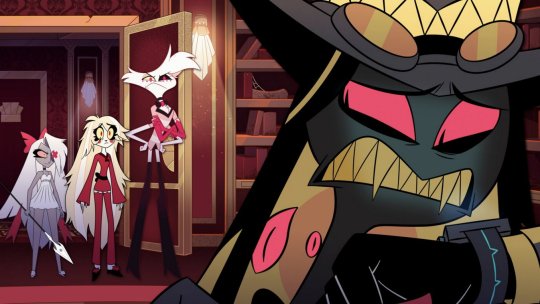
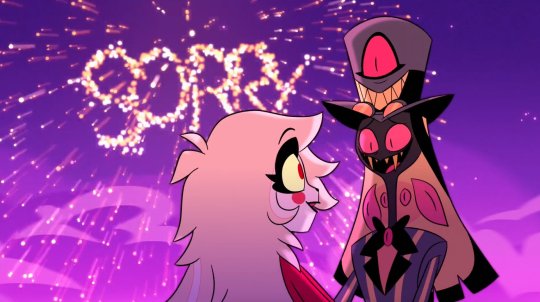
In the episode 'Radio Killed the Video Star', Sir Pentious's facade of villainy crumbles, exposing his true vulnerability. Tasked with espionage and facing failure, he is met with a cruel ultimatum from Vox to end his own existence. This moment of despair highlights his low status in Hell and his profound misery, a stark contrast to his usual bluster.
For all of Sir Pentious's bluster about being a card-carrying villain, he knows how low on Hell's totem pole he is, and he's completely miserable about it. When Vox hires him as a spy in the hotel only for it to fail in less than 24 hours, Vox tells him to kill himself, and Sir Pentious's reaction is to roll into a ball and ask Vaggie and Angel Dust to just finish him off before Charlie intervenes and inspires him to try reforming for real.
Sir Pentious's readiness to accept death at the hands of Vaggie and Angel Dust further underscores his desolation. However, Charlie's compassionate intervention offers him a lifeline, suggesting that redemption in Hazbin Hotel may be more attainable than previously thought.
Charlie's belief in the possibility of redemption becomes a turning point for Sir Pentious. Her insistence on a sincere apology resonates with him, and he embraces the opportunity for change. This pivotal moment marks the beginning of his transformation from a villain to a character capable of genuine growth and redemption.
Bonus Points: In "Scrambled Eggs", Husk complimenting Sir Pentious becomes even more heartwarming when the next episode revealed Husk was a former Overlord, meaning that, in a way, Sir Pentious did get an Overlord's approval.
The Ultimate Sacrifice
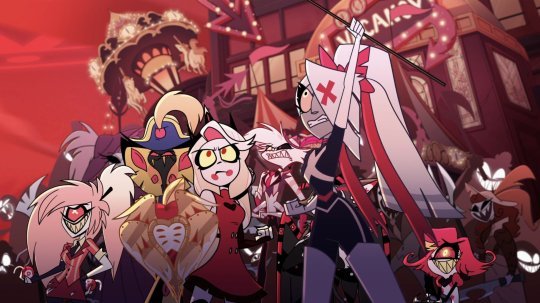
As the Bible itself says: "Greater love has no one than this: to lay down one’s life for one’s friends" (John 15:13), which is exactly how Sir Pentious died a second time- he used his weaponry knowhow and battle experience not to conquer, but to save his loved ones.
Sir Pentious' journey culminates in 'The Show Must Go On', where he makes the ultimate sacrifice for his friends. His transformation into an angel and subsequent ascension to Heaven is a testament to his character development and the power of selfless love. His final act of heroism, a failed but brave attack on Adam to protect the hotel, may not have succeeded in its intended purpose, but it demonstrated his willingness to lay down his life for others. This act of valor is a poignant illustration of the biblical principle that there is no greater love than to sacrifice one's life for friends.
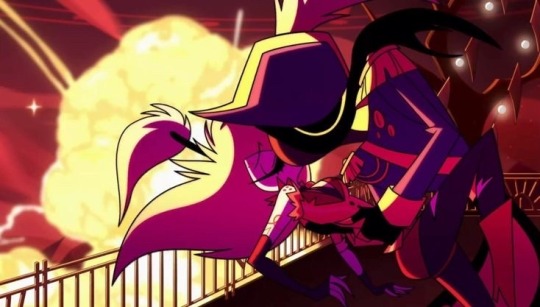
Right before his act, Pentious gives Cherri a kiss and tells her to remember him, which she actually finds kind of hot. Because Sir Pentious was reincarnated into heaven, it's likely this ship will never be canon, unless Cherri Bomb ascends.
While Angel Dust was technically the first occupant of the hotel, his motivations were initially self-serving. Sir Pentious, on the other hand, becomes the hotel's first genuine client seeking redemption. His initial intentions may have been dubious, but his journey towards redemption and ultimate success in reaching Heaven is a powerful narrative of transformation and hope.
Sir Pentious being sent to Heaven actually matches the rules made by Adam in "Welcome To Heaven".
"Act selfless". He showed only kindness after he joined the hotel for real.
"Don’t steal". He returned the only thing he stole (part of Alastor's coat) back to its rightful owner, and apologized for it at the same time.
"Stick it to the man". He died trying to attack Adam, the Original Man, to save his friends.
A New Precedent in Hazbin Hotel
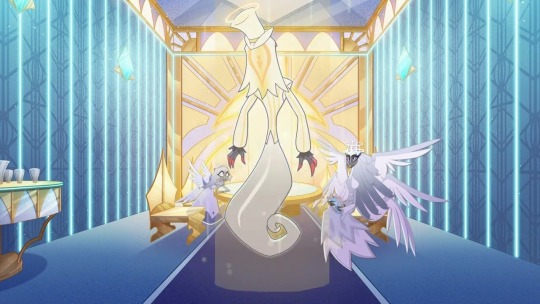
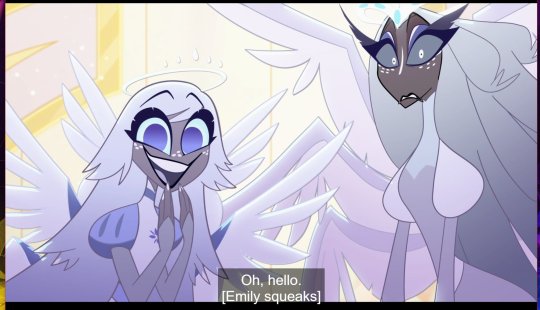
Emily's general lack of presence in the finale is a sad detail in itself. Despite her horror at the exterminations and promising Charlie that she'd figure out someway to help her, in the end it appears she wasn't able to do anything at all. Before Sir Pentious appears (thus vindicating both Charlie and Emily), Emily is shown dejectedly lying down on a table in apparent silence with Sera sitting next to the door. The implication being that Sera was able to successfully prevent Emily from doing anything about the exterminations, and/or that Emily was worried about the potential consequences of going behind Heaven's back.
Sir Pentious ascending to Heaven. Pretty much gives Charlie the last laugh against any and all naysayers who think redemption is beyond sinners. His arrival in Heaven, particularly in front of Sera and Emily, signifies a moment of triumph for Charlie's vision and shakes the foundations of what is believed possible in the afterlife.
Sir Pentious' character arc in Hazbin Hotel is a compelling narrative of redemption. It challenges the notion of irredeemable villainy and celebrates the potential for change, even in the darkest of places. His story is a beacon of hope for all who seek redemption and a reminder that everyone has the capacity for transformation.
#hazbin hotel#hazbin analysis#tumblr milestone#vivziepop#sir pentious#cherri bomb#hazbin hotel sir pentious#sir pentious x cherri bomb#hazbin hotel cherri bomb#hazbin hotel analysis#character analysis#redemption
88 notes
·
View notes
Text
Jin Guangyao and Wei Wuxian aren't the same.
Jin Guangyao is one of the best written characters I've come across. A villian that doesnt look like one, doesnt act like one, is likeable, has strong motivations and a defined personality and extremely fun to read fanfics about. But what I dislike is the role that fanon gives him; specially his role in the story with allusions to Wei Wuxian, casting Jin Guangyao as someone similar to Wei Ying. The "poor children turned to forced villains" trope. This meta is about WHY that's NOT true.
The humiliation of his mother didn't give him the right to burn down an entire brothel. (personally, I found it satisfying but). The desire of acceptance from his father was a motivation for his crimes, not a factor that validates those crimes. Often, Jin Guangyao is treated as the counter part of Wei Wuxian. They both share only three similarities, however:
1. Both came from low backgrounds and struggled a lot in their childhoods. Meng Yao had food, but witnessed constant humiliation. Wei Ying had nothing, and then got tangled into the fucked up dynamics of the Jiangs.
2. Both were found to be much different than what people believed them to be. Wei Wuxian was supposed to be evil, hateful, a murderer who kills just to satisfy his blood thirst and need for power, a monster. Jin Guangyao was supposed to be the guy who worked hard and rose to the top, humble, kind, honest and pure of heart.
3. Both had their reputations destroyed from targeted rumor mill.
That is all.
Other than that, Jin Guangyao is NOT at all similar to Wei Wuxian by any measure. He had to do bad things because he desired power, and to gain, power in a corrupt world, you need to be even more corrupted. He killed all those who looked down upon him (not bodily harm him). He clenched his teeth and killed everyone who protested against him or questioned him. He silenced everybody before they could silence him. He isn't SOLELY responsible but he only played the cards that would bring HIM benefit, not the cards that were righteous, or good, or kind.
Wei Wuxian never desired power, was willing to give up a limb for the safety of his sect. When has he ever raised his sword or his flute if not in self defense? When has he ever attacked first and when has he ever killed an innocent? The only innocent he's most directly responsible for is Jin Zixuan and that was too, in an ambush, where he was asked to back down.
Not just that, everyone is always talking about the Nightless City massacre but never about the Burial Mounds Seige 2.0 where all of the cultivators WOULD have DIED, if not for Lan Wangji and Wei Wuxian.
If your reasoning behind justifying Jin Guangyao's actions and murders is the "intention" then you come across as hypocritical if you condemn Wei Wuxian for the Nightless City massacre, ignoring everything that led to it. His prowess in cultivation, his natural genius, and his terrifying powers that he built himself even after losing a core are not crimes that he should be punished for, but he was. Because he's supposed to be just the son of a servant. How dare he be so powerful? So many attempts on his life were made and he survived them all. So many attempts to summon his soul, and they didn't work.
Is surviving a crime? For the Jiang Cheng stans who always thrust the survivor narrative onto JC, this is a question for them. Was Wei Wuxian wrong to have survived incidents in which he was being attacked? Should he have died for doing absolutely nothing wrong, other than having a different voice? For standing against a structure that always prioritizes one being above all, being the ultimate voice that cannot be questioned?
Here I'm going to quote some parts from the ExR translation of Villanous Friends:
He Su, “What was the irresistible trend? What was stirring up trouble? Jin GuangShan wanted to establish the position of chief cultivator only to imitate the QishanWen Sect in being the only ones at the top. Do you think all the world is ignorant? You frame me like this only because I spoke the truth!”
When you really succeed, all of the world of cultivation would see the true face of the LanlingJin Sect. Do you think killing me alone would put you eternally at ease? How wrong you are! We, the TingshanHe Sect, teem with talent. From now on, we’ll unite and never surrender to you Wen-dogs of another skin!”
Sounds familiar?
After a few laughs, he continued, “Sect Leader Jin, let me ask you something else. Do you think that, because the QishanWen Sect is gone, the LanlingJin Sect has all right to replace it?”
Wei WuXian added, “Everything has to be given to you? Everyone has to listen to you? Looking at how the LanlingJin Sect does things, I almost thought that it was the QishanWen Sect’s empire all over again.”
Wei WuXian, “Did I say something wrong? Forcing living people to be bait and beating them up whenever they refused to obey—is this any different from what the QishanWen Sect does?”
These were voices that questioned the greater powers. This is what happened to these voices:
Jin Guangyao: That’s not the way to go about things, is it? The TingshanHe Sect rebelled and schemed to assassinate Sect Leader Jin with all its forces before it was caught red-handed. How could that be called without a reason?”
Flashback to Wen Chao, asking if the disciples in the Xuanwu Cave were rebelling when they protected Mianmian who was asked to be the live bait of a monster.
Also, flashback to Wei Wuxian standing up for the Wens and being called a rebel when he stood up for the Wens who were being used as live baits to strengthen the Jin.
The ones over there cried, “Brother! He’s lying! We didn’t, we didn’t!”
Flashback to Wen Ning "losing control" at Koi Tower probably due to Xue Yang's invention. But the point to be taken away is that Sect Leader He Su's younger disciples, who are harmless, are framed as murderers. A position similar to what Wei Wuxian was put into.
He Su, “Utterly nonsense! Open your eyes and fucking look! There are nine-year-old children here! Old men who can’t even walk! How could they rebel against anything?! Why would they assassinate your dad out of nowhere?!”
Funny how the evils of society comprised of old grandmas, uncles, a toddler, a doctor, a fierce corpse, and a cultivator with no status, no core, no money, no voice living in a cave with a pool of blood, digging the Burial soil to grow some potatoes.
And not those who were sitting on their thrones, reveling in riches and ordering people around.
Jin GuangYao, “Because you made a mistake and committed murder, Young Master He Su, while they refused to accept Koi Tower’s conviction of you, of course.”
"A mistake" reminds me of the incident at qionggi path. Even if Jin Zixuan hadn't died that day, they would've kept cornering Wei Wuxian until he'd have no other choice but to go on the offensive (which is what he did.)
Turns out even being sooo powerful that he could shake mountains, he eventually died.
Yet, at such a place, nobody would listen to his protests. Sitting before him were two villains who already treated him as though he were dead. What they enjoyed was precisely his dying struggle. Smiling, Jin GuangYao leaned back, waving his hand, “Hush him up, hush him up.”
"You shut them in live?"
Xue Yang turned around, curling his lips, “Wei WuXian never used live humans, but I wanna try.”
So, Xue Yang is an actual demonic cultivator who's protected by the Jins, murdered 2 entire clans and this is the third one and godness knows how many more. Absolutely very few people give actual fucks about what cultivation methods to employ. The one who really cared was perhaps, Lan Wangji.
Jin Guangyao as you can see isn't being "forced" to kill people because he's of lower birth and nobody accepts him :(
He's killing people to silence those who speak against his and his father's (and they both are one and the same entity. he's acting on his father's orders which he could've disobeyed and run away but he would lose his sect reputation and standing.)
Why does his reputation and standing mean more than the lives of all these 70 people ?
Were they trying to kill him? No.
Did they attack him first to the point he would lose his life? No.
Would they have thrown him into a whore house? No.
Let us please not compare Wei Wuxian and Jin Guangyao.
MXTX wants us to know what's said and told may not be right. Wei Wuxian isn't fond of the techniques that are used to confirm Jin Guangyao's demise. He's critical of how nobody else is concerned. He's unsure of what NHS's motivations are - does he now want complete power? or did his plan only extend up to his revenge? He's critical of how only yesterday people were all over this guy and today they hate him. Critical of how society works on what is favourable and not what is true.
But he's not SUPPORTIVE of Jin Guangyao. He's sympathetic to people turning onto you, but not empathetic towards Jin Guangyao. He believes Jin Guangyao to be a cruel man.
Those are two different things.
Nobody knows better than Wei Wuxian how it feels to be set up at every step:
1. Firstly he was used as a punching bag for Madam Yu and an emotional one for JC throughout his childhood
2. The Wens completely played him up, setting him as the cause of LP's fall.
3. Then, he was played by the Jins and the cultivation world until his death by validating JC's jealousy against him, by villianizing him and estranging him, by setting up the ambush, by sending JZX, by making false promises, by not checking for validity, by controlling Wen Ning, by setting up the seige parade, by getting JYL there, and finally the seige. (even after his death disrespecting his all)
4. He was brought back to the world on the revenge plans of NHS and tossed like a tennis ball from the plans of NHS and JGY. Yi City arc? children would've died -> NHS. Burial Mound seige 2.0? everyone would've died -> JGY. if LWJ wasn't with him at every step of the way, Wei Ying would've once again been in such a spot. Without any status or authority he would've gotten no help, no aid, and been villianized once more. He would've been stabbed and captured with nobody to save him. He would've made himself the bait without anybody to fight the monsters off.
Each of us have individual capacities and also, each of us have the one thing we cannot let happen:
1. Wei Ying can't let injustice prevail and sit by the side doing nothing
2. Jin Guangyao can't take in being stripped of power and being a lowlife again.
Those are two very different things. JGY made every decision he could to escape his grand fear, which was personal. I don't condemn his motivations personally cause I find them hot. Similar to how I find his character hot. Yet, he's not the hero on the opposite spectrum. He's not the lowlife who was killed because people can't handle people from lower birth statuses being on the top chairs for making decisions - but that is also true - but is not the reason behind his tragedy. Not the sole reason and also not the most important reason.
The most important reason is as it is said: he believes himself to be different and values his life over others, similar to Xue Yang. Their personalities vary greatly, yet his "true" friends were Xue Yang and Su She. (He showed glimpses of the truth and of his reality to LXC. So, he's hiding the truth and LXC doesn't wish to dig deeper anyways thus not a true friendship.) One wished to take revenge in extremely unfair shares, a clan for a finger. A clan for a son. The entire cultivation world could die but he couldn't be badmouthed or put on trial or killed. The other - Su She, wished to be recognized by those who he equally hated, despised and considered arrogant and also was jealous and envious of. So, these two traits - great desire for revenge onto everyone who's ever said anything mean about him, and the desire for power. You may argue how this developed from his childhood trauma but you can't argue that this justifies his cold blooded crimes because it doesn't. Another thing I'd like to add is that, his friendship with Lan Xichen also shows his personality; not wanting to take the messy, big path (such as showing up to your own death planning party, or planning a death party) and his relatively calm nature. Yet just like the friendship it is fragmented and fake; a composure that is stuck onto the cold, and hot brimming desire for power.
There was one character who had to kill a large number of people or would have no other option left and it wasn't Jin Guangyao. There was one character who was hated by society solely because of his background and his desire to protect people and it wasn't Jin Guangyao. There was one character who had to give up everything for what he believed in and it wasn't Jin Guangyao. There was one character who ended up being the indirect reason for the passing of loved siblings due to the unjust society.
and it wasn't Jin Guangyao.
(but there were two characters who had confirmed sex before marriage. one of them was Jin Guangyao)
#mo dao zu shi#mdzs#mdzs meta#wei wuxian#jin guangyao#xue yang slaughtered 2 clans and was protected by the jins#xue yang#cultivation world bullshit#jin zixuan#wei ying#burial mounds#wen remnants#my meta#my thoughts#my essays
173 notes
·
View notes
Text


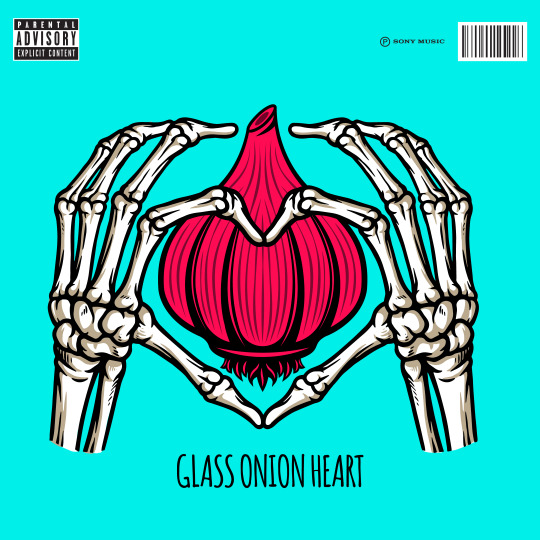
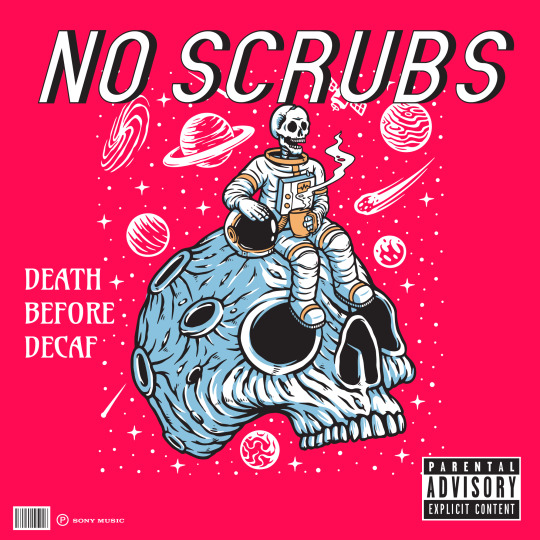
Running List of No Scrubs Albums
Because even I can't keep up with them anymore lol. I'll update it as I go. Also yes there are 6 official albums with 6 songs each... because Gojo is lame lol. And yes the acoustic albums are 5 songs... because he's extra lame
Spotify Playlist
update as of 09/18/23 bc I'm a f** scrub with commitment issues clearly
1. Thanks, I Hate it Here:


The 2nd album by release order, but first in chronological order of when they played them live. Yes, Gojo was feeling himself in his classic FOB phase real hard on this one lol. I find the evolution of FOB's discography IRL to be really fascinating, so I wanted to emulate it in the fic. This album is almost entirely FOB because Gojo realized flopping around bands and genres was difficult for the rest of his band, so he decided to first focus on one kind of ‘sound’ until they got used to playing together.
Critics will later call it a bit unpolished and juvenile in comparison to the refined sound, themes, and quality production of later albums, with it's younger and simpler narratives. Thematically it tends to resonate more with a younger crowd, which people accredit to Ru-kun's assumed age of writing at the time (late teens). In other words, it becomes the quintessential 'middle school glory days' playlist for an entire generation of No Scrubs fans.
A Loaded God Complex - (Sugar We're Going Down) FOB
Reinventing the Wheel to Run Myself Over - FOB
In Too Deep - Sum 41
Homesick at Space Camp - FOB
A Little Less Sixteen Candles - FOB
Dance, Dance - FOB
-
2. Good News For People Who Love Bad News

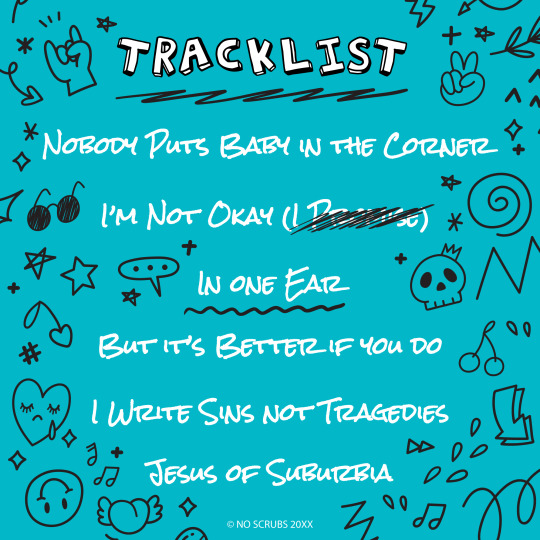
This was No Scrubs' first album ever released on a streaming platform, but it compromises songs more from their 2nd live setlist chronologically. A cult favorite amongst the fans, this album is fun and bratty with a combination of punchy pop punk lyrics, theatrical narratives, and catchy hooks that become unanimous with the band's dramatic flair. No Scrubs always had a rep as an underground alternative band with petty delinquent vibes, but this album definitely solidified them as the patron saint of all the edgy and misunderstood goth punks.
At this point the band had been together for a few years and Gojo definitely felt satisfied with the way the band was coming together and wanted to throw in some more famous mid 2000s pop punk bands into the mix.
Nobody Puts Baby In The Corner - FOB
I'm Not Okay (I promise) - MCR
In One Ear - Cage the Elephant
But It's Better if You Do - Panic!
I Write Sins not Tragedies - Panic!
Jesus of Suburbia - Green Day
-
3. Death Before Decaf

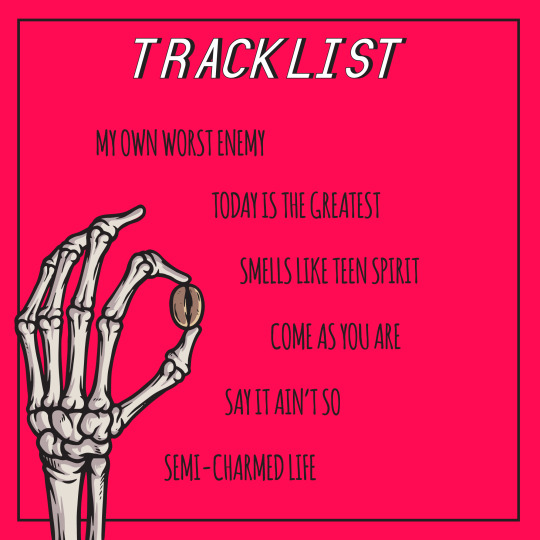
After playing up the 'pop' quite a bit in the last album, No Scrubs digs deep into some gritty grunge roots with their third album, full of noisy amped up rock anthems. Thematically it was considered their strongest album at the time of release, with intense vocals and lyrics covering dark and personal topics beneath the guise of their distinctive and iconic instrumental riffs. The juxtaposition between the catchy sing-along hooks and the depressing deeper meaning to the words made this album an instant classic. It remains a fan favorite of music critics for Ru-kun's scorchingly honest handling of raw and deeply personal themes like suicide, depression, and substance abuses. After the identities of the band members became public, it became a hotly debated album amongst No Scrubs fans, who consider it a cathartic outlet for a lot of the trauma that turned Ru-kun into a villain, but also a worrying one full of suicidal ideation, alcoholism, drugs, and child abuse.
On his part, Gojo was feeling nostalgic for his youth and felt it an affront that the likes of Nirvana and Weezer had never been experienced in the MHA universe. He gets asked about these songs a lot, specifically about Today, Semi-Charmed Life, and Say it Ain't So, which all seem to allude to a dark history. He often tells people Semi-Charmed Life is one of his favorite songs ever, which doesn't help matters, and also alarms several psychologists, who worry he's romanticizing what was clearly a very unhealthy time in his life.
My Own Worst Enemy - Lit
Today is the Greatest - (Today) Smashing Pumpkins
Smells Like Teen Spirit - Nirvana
Come As You Are - Nirvana
Say It Ain't So - Weezer
Semi-Charmed Life - Third Eye Blind
-
4. Glass Onion Heart

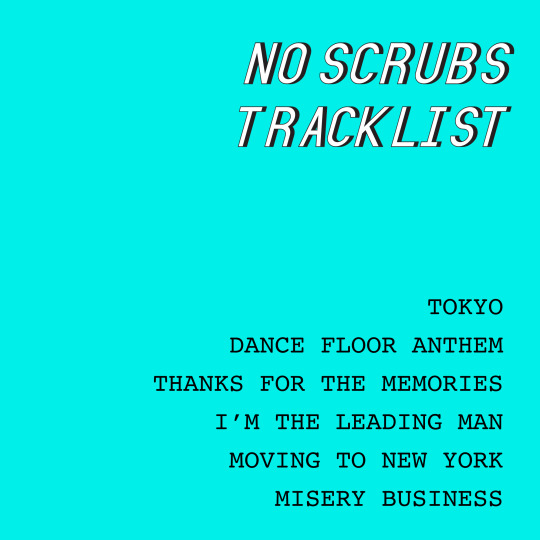
Aka the "Baby boy who hurt you???" album inspiring sexuality crises across the world
Glass Onion Heart feels like a wild card of metamorphosis from No Scrubs' prior albums, with the addition of more electronic, pop, and synth instrumental mixing. Combined with the explosive and flashy tour that accompanied the album's release, it felt like a radical departure from the band's classic garage-band sound, into a more streamlined, pop format.
The album was met with divisiveness from fans, not helped by the news of the band's breakup following the album release and subsequent tour. While many adored the new direction, long-time fans mourned the loss of the quintessential indie and underground 'No Scrubs' aesthetic, especially when faced with the thought of their final album. Nonetheless, it was the band's most popular album at time of release by a wide margin. It certainly helped the album's popularity that Ru-kun did the entire tour in drag.
At this point fans the world over became intrigued by No Scrubs and their burgeoning fame, prompting Gojo to name the album 'Glass Onion' after the Beatles song of the same name, because there is no deeper meaning to any of his songs, he's literally ripping them off from bands that don't exist. Fans spend way too long trying to figure out who this album was inspired by - who could have possibly broken their precious Ru-kun's heart?? - and as we enlightened No Scrubs fans know, it was no one. Literally no one. Gojo just really liked this femme fatale vibe, and decided to cross dress the entire tour because of it.
Tokyo - The Wombats
Dance Floor Anthem - Good Charlotte
Thanks for the Memories - Fall Out Boy
I'm the Leading Man - (This Ain't a Scene) Fall Out Boy
Moving to New York - The Wombats
Misery Business - Paramore
-
5. Infinity on High

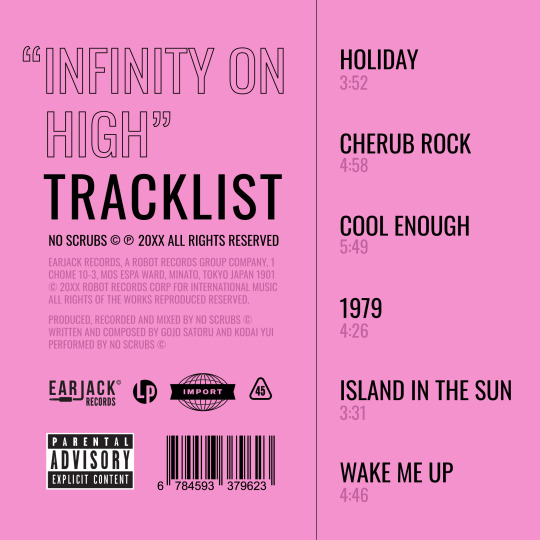
Hailed as a return to the unfettered, unabashed, anti-establishment garage-band jam-session appeal that had people flocking to No Scrubs in their heyday, this album made an intense splash as No Scrubs' Comeback Album. Despite the return to their signature gritty rock sound, this album was in fact the most produced of any of No Scrubs' albums. This album marks both the return of No Scrubs as well as their launch into global superstardom.
Ironically, Gojo named this after his favorite FOB album (I mean it IS called Infinity lol) despite not including a single FOB track. Fans widely consider "Island in the Sun" to be specifically about Hawks, which Gojo never confirms or denies (although he definitely did think the similarities to their island mission were amusing). In reality, the song that reminds him of Hawks - and himself - the most is Mayonnaise, which might be why it's one of his favorites.
Holiday - Green Day
Cherub Rock - Smashing Pumpkins
Cool Enough - (Mayonnaise) Smashing Pumpkins
1979 - Smashing Pumpkins
Island in the Sun - Weezer
Wake Me Up - (Wake Me Up When September Ends) Green Day
-
Bonus: Don't You Know Who (I Think) I AM? Acoustic Album

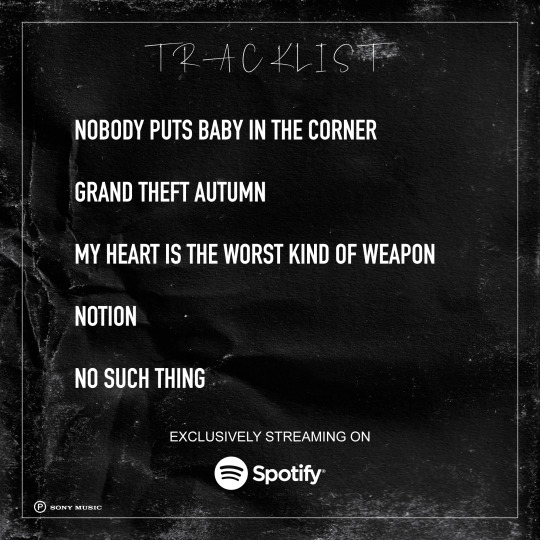
The first of Ru-kun's unexpected - and according to Makoto, utterly unplanned - acoustic albums, this bonus LP was met with delight and excitement from fans after Ru-kun had teased its release on Twitter. The intimate and personal nature of the simplistic mixing gave this album a cult following, and brought in a new segment of music fans that No Scrubs' music normally didn't appeal to.
Nobody Puts Baby In the Corner - Fall Out Boy
Grand Theft Autumn - Fall Out Boy
My Heart is the Worst Kind of Weapon - Fall Out Boy
Notion - Rare Occasions
No Such Thing - John Mayer
-
Bonus: Take (Me) With a Grain of Salt
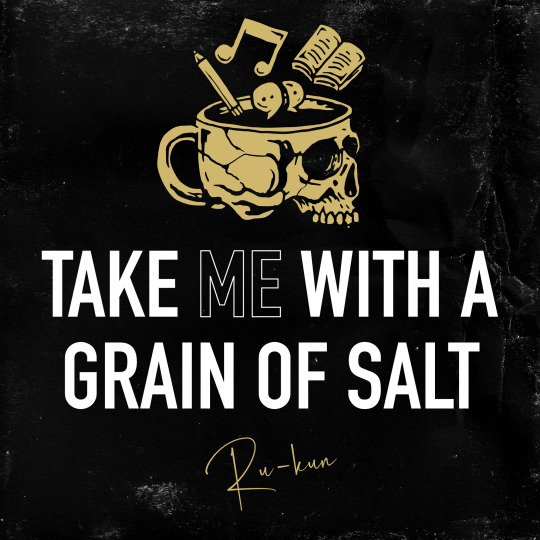

Despite the critical acclaim this acoustic album (and the full band versions eventually released afterwards) it was met with a lot of incendiary response at the time of its release. No Scrubs had finally achieved global stardom and was regularly topping hit charts across the world with the release of their album Infinity on High - and while music critics unanimously praised the EP as a worthy contender for Album of the Year, it was generally acknowledged truth that the album's popularity was owed in no small part to lead singer Ru-kun's sudden infamy that coincided at the same time.
The unfathomable depths of Ru-kun's new celebrity status in parallel to the band's brand of off-label, anti-establishment themes created friction within the fanbase. Many accused them of taking advantage of the current media coverage to promote sales, which bassist and band leader Makoto clapped back as 'just doing smart business'. In general, consensus was positive towards the sentiment; capitalizing on Ru-kun's fame and releasing an album in parallel to his identity reveal was just genius marketing.
However the timing of the release of Ru-kun's second acoustic album kicked up the discourse once again, with fans decrying the release as 'a fake sellout' aimed to exploit current gossip trends. However the album's drop was sudden and unexpected - with little to no pre-release marketing - lending credence to the narrative that Ru-kun wrote this album under the emotional duress of his personal life at the time.
Due to the staggering popularity of the acoustic album, the band eventually recorded and released a B-Side with full band versions.
Disenchanted - MCR
Stay Together For the Kids - Blink-182
Iris - Goo Goo Dolls
How's It Going To Be - Third Eye Blind
All These Things That I've Done - The Killers
175 notes
·
View notes
Text
Let's talk about the insane idea promoted by the hero society that self-sacrificing and sadness is better than hurting others and feeling rage. Or in other words, how dying for other and repressing your feelings even if they destroy you is better than becoming violent and letting your rage affect the course of the daily basis.
For the hero society, submissive individuals were better. Depressed as in being unable to act was better. Passive behavior was better. It's easier to feel pity and hold some mourning for the victims before moving on as if nothing happened.
Take Deku. If he had died by suicide only a few would care. He was an unimportant quirkless kid with no real potential to be a hero. Or if he had died saving Bakugo he would have become a martyr, a quirkless kid who got to be a hero for a day before tragically dying. The end.
That is why Aizawa is mad with All Might when he sees Deku. He could have died in the UA entrance test, it was impressive but what about Deku's life. That's also what Recovery Girl told All Might in the UA Sport Festival. That's what Deku needed to learn when he started using kicks instead of punches. Self-sacrificing shouldn't be idolized by the hero society. Ultimately, it is murder in the hands of the authorities who enforce such idea.
Take the League of Villains.
Ugly victims don't get help.
⠀
Ask Tenko. Walking alone on a busy street, with blood on his hands and eyes totally lost. No one helped him. He was not a cute kid crying like Eri, he was monstrous like. His accident was not one caused by a victim. It was the abuse of his father and tje unfortunate awakening of his quirk that ended with him murdering his entire family.
If he had stayed sitting silently, unable to weep or talk or cry, he would have died and no one would have known. Society would be happy because there's no Shigaraki Tomura, right?
Touya died on a forest fire and life moved on. His dad became even more abusive and reached the number one spot on the hero charts. Like the past never happened.
Toga's neglected childhood pushed her to the point she exploded and drank the blood of someone, but because she was already a monster like looking child, she wad regarded as a danger and his parents erased her presence from their house. If she had died on the streets or gotten captured, people would just think "good, one less psycho, we can keep going with our days".
Visually, it's easier to sympathize with a crying victim full of sadness and wounds. Some animal instinct of who knows. I don't. BUT it's way harder to sympathize with someone who shows their hurt by being very disruptive, loud, angry, violent. Especially if they can't cry, singe people equals crying to regret or pain. If someone is unable to cry, there must be something wrong with them.
⠀
The League of Villains goal in the narrative at the beginning of bnha is less Stain-like (there are a few bad apples in the basket we need to purge and everything will be good again) and more of Shigaraki's own ideology: society is rotten to the bone, even the greatest of heroes is corrupted and the cycle of violence is being used by the hero society as an excuse to control the public.
Funny. It was not a lie. With Lady Nagant's story and even with Hawk's we were witnesses of how the hero society was indeed rotten. And we saw a few paragraphs above why All Might was part of the corruption, if with good intentions, but still an important part of it.
There are two main responses to trauma in bnha. The hero society prefers the one that doesn't make them look bad.
⠀
So, what's the kick?
What happened with the League of Villains would have happened eventually with any other group of individuals. It was a natural reaction to a failed system, one AFO took advantage of in order to further his plans.
There was the Meta Liberation Army, where many or his members were pro-heroes btw. There was the situation with Overhaul and the whole issue with the quirk repressing drug. You had Aoyama, the hospital full of kids Touya woke up to, etc.
In order for a change to happen, a reactive factor was needed. Individuals who were not afraid to threat the commodities of the population, their peace of mind, people willing to ne disturbing and people able to shake the hero society foundations. It's not coincidence that those individuals were the same victims who, after being passive for so long, decided peace was not an option.
Am I justifying the actions of the League and blaming everything on the heroes ? No, I'm not.
Killing is killing. Murder is murder. We're not going machiavelli on here and saying they had no other choice (both heroes and villains).
What I'm saying is that both sides were equally right and wrong. Many heroes and villains got used by bigger players in the game. Ultimately the fight started being between the institutions of power around the world and AFO. In Japan, it was the Hero Commission.
Like in any other war, many heroes and villains killed each other thinking it was the right thing to do in order to help society reach higher ground, get better, heal, be safe, whatever. Brainwashed for sure, loyal to a cause that's not loyal to them.
⠀
The kick is in balance.
You can't take the blame of other actions and punish yourself for it. You can't make others responsible of your own actions either. You shouldn't be putting your life above others and you shouldn't be putting their lives below you.
Learning to separate the responsibilities, to notice the shades in which anger and sadness mix, to be able to say "we all matter equally" and know it means a victim can be an abuser too and deserves help as much as they should be hold accountable for. These are the struggles of bnha.
Good communication to avoid mindless violence.
There's where Deku and Tomura meet, in the middle of those lines. There's where Shoto and Dabi meet, where Toga and Ochako meet.
The Messiahs vs The Judas, assigned a role to play by society, either die or be killed tragically. The moment they can shed of those roles and see each other as human beings, that's the moment things will start changing for good.
#bnha#mha#boku no hero academia#my hero academia#Bnha meta#Mha meta#Shan's bnha meta#Shan's mha meta#mha spoilers#bnha spoilers#lov#league of villains#Midoriya Izuku#Deku#shigaraki tomura#Tenko Shimura#Toga himiko#Dabi#Touya Todoroki#Toya todoroki#Afo#All for one#Horikoshi#uraraka ochako#shoto todoroki#todoroki shouto
567 notes
·
View notes
Text
Here’s Part 2 of some ideas I’m doodled for my Winx rewrite
Last post seemed to do better than I expected and I’m glad a few people enjoyed it. So here are some more things I want to work with.
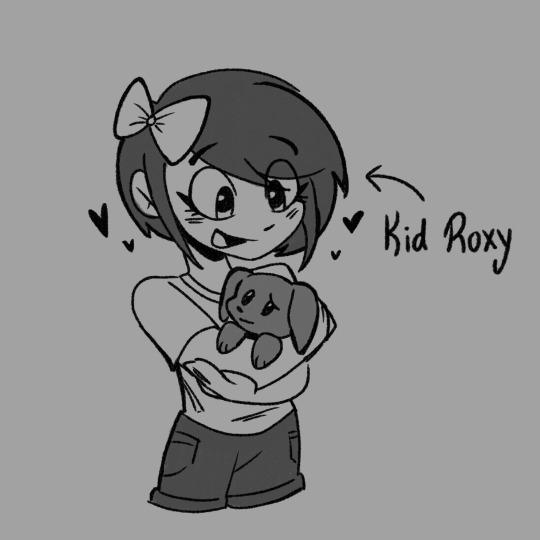
I like Artu and Roxy’s relationship but I would have also liked some backstory on them and more depth. Like Gantlos said “it’s just a dog”. How did Roxy get Artu? Is he adopted or bought? Is there a reason he doesn’t like anyone outside of Roxy and Klaus?
In my rewrite, yes. Abandoned as a puppy, a kid Roxy took him in after her mother left her dad unexpectedly. She basically raised Artu and he means a lot to her, but she never socialised him since she herself isn’t social with people (so while Artu may tolerate someone’s prescence he doesn’t like being touched or seen upclose). Roxy raising Artu is also why she gets pissed and earns her fairy form but doesn’t want the fairy gig since it ended up hurting her dog, because as a fairy the wizards are after her and Gantlos hurt Artu.
Speaking of Gantlos
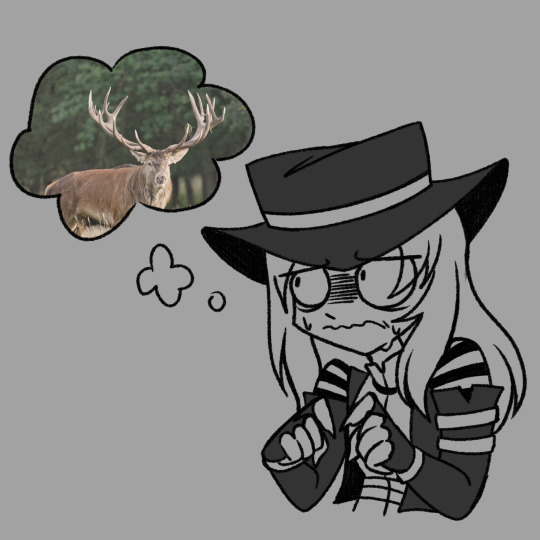
Gantlos my beloved you’re so fucking bland the only personality trait you have is having fucked up pointy hands and a cool hat <3
Ok in all honestly I like his apathy to animals and the Winx in general, but that also applies to the other wizards to some extent. At least you can say something about the other wizards; Orgon’s voice is top tier, Duman has really cool powers and design, Anagan’s banter with Flora’s entertaining. This one’s technically a headcannon I made cannon in the rewrite. I did my research btw.
Gantlos has a pretty intense fear of deers also called Elafiphobia, even asking Duman to not shapeshift into one. It’s pretty bad, seeing a deer gets him pretty close to a panic attack. I’m not going to spoil why but I’ll say it’s a consequence of the Great Fairy Hunt. In fact all the Wizards despite being the cause have been affected by the fairy hunt, either overall or because of a major event. Gantlos’ deer phobia is also why he doesn’t like/care about animals initially, I mean, why should he like them? Just cause they’re cute? Hah!
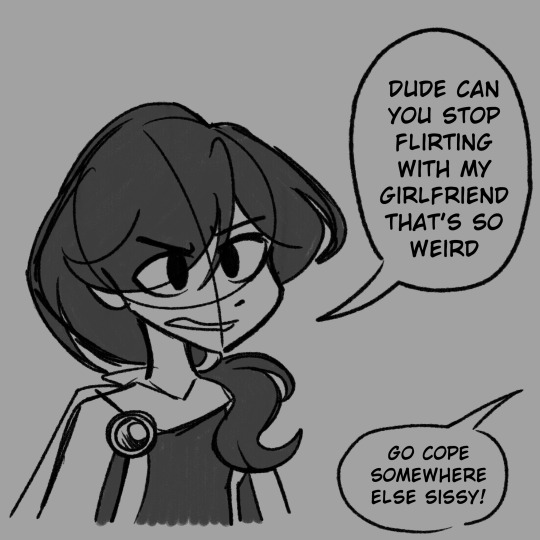
Apart from Riven and Musa I hate the melodrama in season 4 it’s so shit. Since in my version Sky isn’t in the story cause king stuff, Mitzi is narratively cremated and Nabu doesn’t die, on top of planning to expand on Anagan and Flora’s relationship as rivals and Anagan “flirting” with her, it’d be weird for Helia to be like “eh”. Like even if Flora can hold her own I think he’d at least be a little concerned and annoyed at Anagan.
So yeah, Helia’s conflict is having a case of Impostor syndrome because Anagan’s a foil to him; confident, extroverted, confrontational, and actually bounces off of Flora really well. (Like, I don’t ship Anagan and Flora but the people who do I don’t blame them, it sounds more interesting) Even if Flora doesn’t reciprocate Anagan’s feelings, Helia feels inadequate and is anxious Flora will lose interest and might even break up with him since he’s the anti-social poet of the group. Timmy could even help after his confidence arc in Season 2. He’s not overprotective of Flora like wanting to fight Anagan since it kinda goes against his pacifism but the narrative doesn’t care about that as much as I do :/
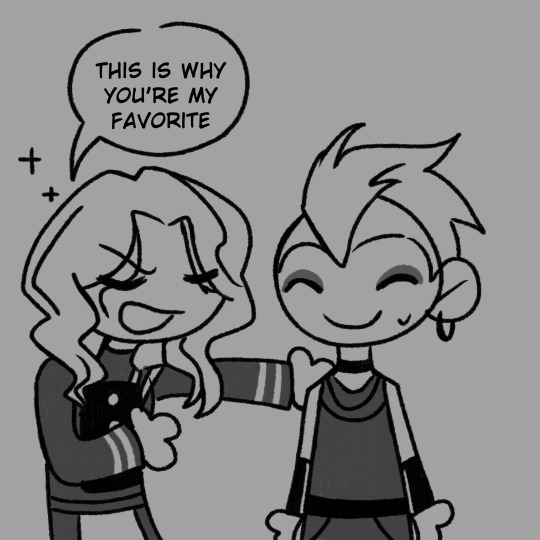
And lastly I think it’s be neat if we saw a more fleshed out dynamic between the Wizards, the best I can think of is when they’re protected by Syllia and Duman almost slips their plan to which Anagan says he’s being whoosy, Orgon complains about being protected by fairies while Gantlos is fine with it.
A lot of the rewrite is focused on fleshing out the wizards because I want complex villains grr, and they’re perfect for it. The Earth Fairies? They’re good but they’re dead in my rewrite soooo-
I like to think Orgon is pretty manipulative of them. Was he always like this? No, but he’s desperate to secure the disappearance of magic from Earth, and his manipulation gets worse and worse as the episodes go on, in the end being threats and guilt-tripping. He still cares but mostly how the wizards can be of service to the Black Circle. And yes Duman is his favorite because he has the best powers. Shapeshifting will always be OP and the best power in my heart.
Anyway that’s all folks. If I make a part 3 it’ll probs cover some other stuff like Jason Queen, which I like his character, it’s perfect for Musa’s development (until they made Bloom the fucking main singer like WHYYY) or perhaps talk about Klaus or Morgana, Tecna and Timmy and more about Nabu. Anyway I’ll go watch some more nostalgic minecraft videos and webtoon rants. See ya!
#winx club#winx rewrite#rewrite#winx roxy#winx gantlos#winx helia#winx orgon#winx duman#wizards of the black circle#winx specialists#art#fanart#digital art#doodles#fanfiction
66 notes
·
View notes
Text
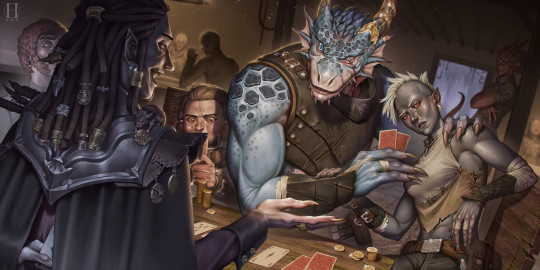
Dm Tip: Playing the Villain/ Guidelines for "Evil" Campaigns
I've never liked the idea of running an evil game, despite how often I've had people in my inbox asking how I'd go about it. I'm all about that zero-to-hero heroic fantasy not only because I'm a goodie twoshoes IRL but because the narrative-gameplay premise that d&d is built around falls apart if the party is a bunch of killhappy murder hobos. Not only would I get bored narrating such a game and indulging the sort of players who demands the freedom to kill and torture at will (I've had those before and they don't get invited back to my table), but the whole conceit of a party falls through when the obviously villainous player characters face their first real decision point and attempt to kill eachother because cooperation is a thing that goodguys do.
Then I realized I was going about it all wrong.
The problem was I had started out playing d&d with assholes, those "murder and torture" clowns who wanted to play grand-theft-auto in the worlds I'd created and ignore the story in favour of seeing how much unchallenged chaos they could create. They set my expectations for what an evil campaign was, and I spent the rest of my time developing as a dungeonmaster thinking " I Don't want any part of that"
But what would an evil campaign look like for my playgroup of emotionally healthy friends who understand character nuance? What would I need to change about the fundamental conceit of d&d adventures to refocus the game on the badguys while still following a similar enough narrative-gameplay premise to a hero game? How do we make that sort of game relatable? What sort of power/play fantasy can we indulge in without going off the deepend?
TLDR: In an evil campaign your players aren't playing the villains, they're the MINIONS, they're mooks, henchmen, goons, lackeys. They're the disposable underlings of uncaring overseers who have nothing but ill intent towards them and the world at large.
Where as in a hero game the party is given the freedom to challenge and overthrow corrupt systems, in an evil game the party is suck as part of that corrupt system, forced to bend and compromise and sacrifice in order to survive. The fantasy is one of escaping that corrupt system, of biding your time just long enough to find an opening, find the right leverage, then tossing a molitov behind you on the way out.
Fundamentally it's the fantasy of escaping a shitty job by bringing the whole company down and punching your asshole boss in the face for good measure.
Below the cut I'm going to get into more nuance about how to build these kinds of narratives, also feel free to check out my evil party tag for campaigns and adventures that fit with the theme.
Designing a campaign made to be played from the perspective of the badguys requires you to take a different angle on quest and narrative design. It’s not so simple as swapping out the traditionally good team for the traditionally bad team and vis versa, having your party cut through a dungeon filled with against angel worshiping holyfolk in place of demon worshipping cultists etc.
Instead, the primary villain of the first arc of the campaign should be your party’s boss. Not their direct overseer mind you, more CEO compared to the middle managers your party will be dealing with for the first leg of their journey. We should know a bit about that boss villain’s goals and a few hints at their motivation, enough for the party to understand that their actions are directly contributing to that inevitable doom.
“Gee, everyone knows lord Heldred swore revenge after being banished from the king’s council for dabbling in dark magic. I don’t know WHY he has us searching for these buried ancient tablets, but I bet it’s not good”
Next, you need a manager, someone who’s a part of the evil organization that the party directly interfaces with. The manager should have something over the party, whether it be threats of force, blackmail, economic dependency… anything that keeps the antiheroes on the manager’s leash. Whether you make your manager an obvious asshole or manipulative charmer, its important to maintain this power imbalance: The party arn’t going to be rewarded when the boss-villain’s plan goes off, the manager is, but the manager’s usefulness to the boss-villain is contingent on the work they’re getting the party to do. This tension puts us on a collison course to our first big narrative beat: do the party get tired of the manager’s abuse and run away? Do they kill the manager and get the attention of the upper ranks of the villainous organization? Do they work really hard at their jobs despite the obvious warning signs and outlive their usefulness? Do they upstage their manager and end up getting promoted, becoming rivals for the boss-villain’s favor?
Building this tension up and then seeing how it breaks makes for a great first arc, as it lets your party determine among themselves when enough is enough, and set their goals for what bettering the situation looks like.
As for designing those adventures, you’ll doubtlessly realize that since the party arn’t playing heroes you’ll need to change how the setup, conflict, and payoff work. They’re still protagonists, we want them to succeed after all, but we want to hammer home that they’re doing bad things without expecting them to jump directly to warcrimes.
Up to no good: The basic building block of any evil campaign, our party need to do something skullduggerous without alerting the authorities. This of course is going to be easier said than done, especially when the task spins out of control or proves far more daunting than first expected. The best the party can hope for is to make a distraction and then escape in the chaos, but it will very likely end with them being pursued in some manner (bounties, hunters, vengeful npcs and the like). Use this setup early in a campaign so you have an external force gunning for your party during the remainder of their adventures.
Dog eat dog: It’s sort of cheating to excuse your party’s villainous actions by having them go up against another villain who happens to be worse than they are. The trick is that we’re not going after this secondary group of outlaws because they’re bad, we’re doing it because they’ve either got something the boss wants, or they’re edging in on the boss’s turf. This sort of plotline sees the party disrupting or taking advantage of a rival’s operation, then taking over that operation and risking becoming just as villainous as that rival happened to be. This can also be combined with an “Up to no good” plot where both groups of miscreants need to step carefully without alerting an outside threat.
The lesser evil: This kind of plot sees your party sent out to deal with an antagonistic force that’s a threat not only to the boss’s plans but to everyone in general. In doing so they might end up fighting alongside some heroes, or accidentally doing good in the long run. This not only gives your party a taste of heroism, but gives them something in their back pocket that could be used to challenge the boss-villain in the future.
The double cross: In order to get what they want, the party need to “play along” with a traditional heroic narrative long enough to get their goal and then ditch. You have them play along specifically so they can get a taste of what life would be like if they weren't bastards, as well as to make friends with the NPCs inevitably going to betray. This is to make it hurt when you have the manager yank the leash and force the party to decide between finishing the job , or risk striking out on their own and playing hero in the short term while having just made a long term enemy. This is sort of plot is best used an adventure or two into the campaign, as the party will have already committed some villainous deeds that one good act can’t blot out.
Next, lets talk about the sort of scenarios you should be looking to avoid when writing an evil campaign:
Around the time I started playing d&d there was this trend of obtusely binary morality systems in videogames which claimed to offer choice but really only existed to let the player chose between the power fantasy of being traditionally virtuous or the power fantasy of being an edgy rebel. Early examples included:
Do you want to steal food from disaster victims? in Infamous
Do you as a space cop assault a reporter who’s being kind of annoying to you? in Mass Effect
Do you blow up an entire town of innocent people for the lols? in Fallout (no seriously check out hbomberguy’s teardowm on fallout 3’s morality system and how critics at the time ate it up)
I think these games, along with the generational backwash of 90s “edge” and 00s “grit” coloured a lot of people's expectations ( including mine) about what a "villain as protagonist" sort of narrative might look like. They're childish exaggerations, devoid of substance, made even worse by how blithely their narratives treat them.
Burn down an inn full of people is not a good quest objective for an evil party, because it forces the characters to reach cartoonish levels of villainy which dissociates them from their players. Force all the villagers into the inn so we can lock them inside and do our job uninterrupted lets the party be bad, but in a way that the players can see the reason behind it and stay synced up with their characters. The latter option also provides a great setup for when the party's actually monstrous overseer sets the inn on fire to get rid of any witnesses after the job is done. Now the party (and their players) are faced with a moral quandary, will they let themselves be accessories to a massacre or risk incurring their manager's wrath? Rather than jumping face first into cackling cruelty, these sorts of quandaries have them dance along the knife's edge between grim practicality and dangerous uncertainly; It brings the player and character closer together.
Finally, lets talk about ending the villain arc:
I don't think you can play a whole evil campaign. Both because the escalation required is narratively unsustainable, but also because the most interesting aspect of playing badguys is the breaking point. Just like heroes inevitably having doubts about whether or not they're doing the right thing, there's only so long that a group of antiheroes can go along KNOWING they're doing the wrong thing before they put their feet down and say "I'm out". I think you plan a evil campaign up until a specific "there's no coming back from this" storybeat, IE letting the Inn burn... whether or not the party allows it to happen, it's the lowest point the narrative will allow them to reach before they either fight back or allow themselves to be subsumed. If they rebel, you play out the rest of the arc dismantling the machine they helped to build, taking joy in its righteous destruction. If they keep going along, show them what they get for being cogs: inevitably betrayed, sacrificed, or used as canon fodder when the real heroes step in to do their jobs for them.
Art
#dm tip#dm tips#writing advice#evil party#drafting the adventure#dnd#d&d#dungeons and dragons#blades in the dark#ttprg#pathfinder
417 notes
·
View notes